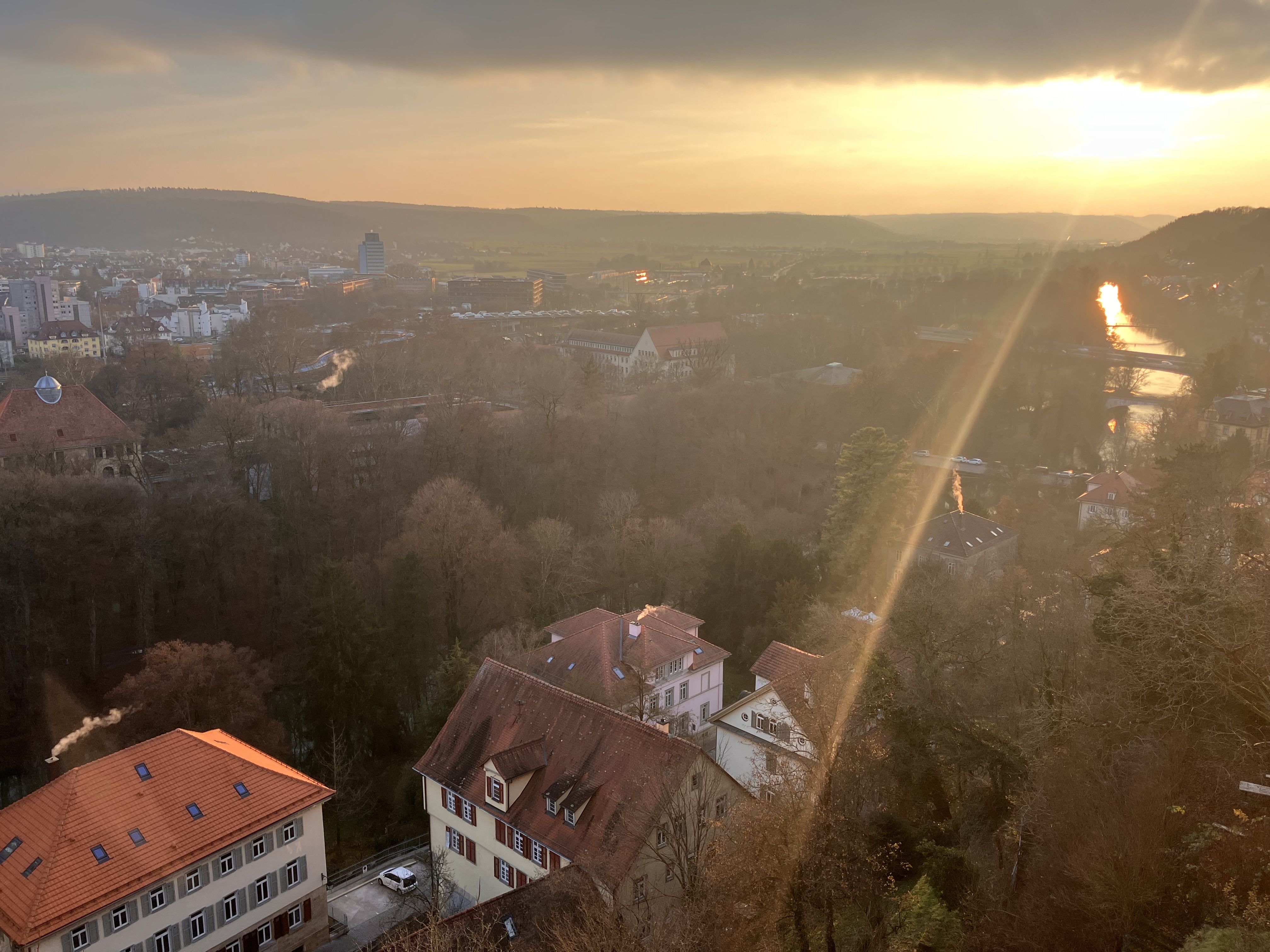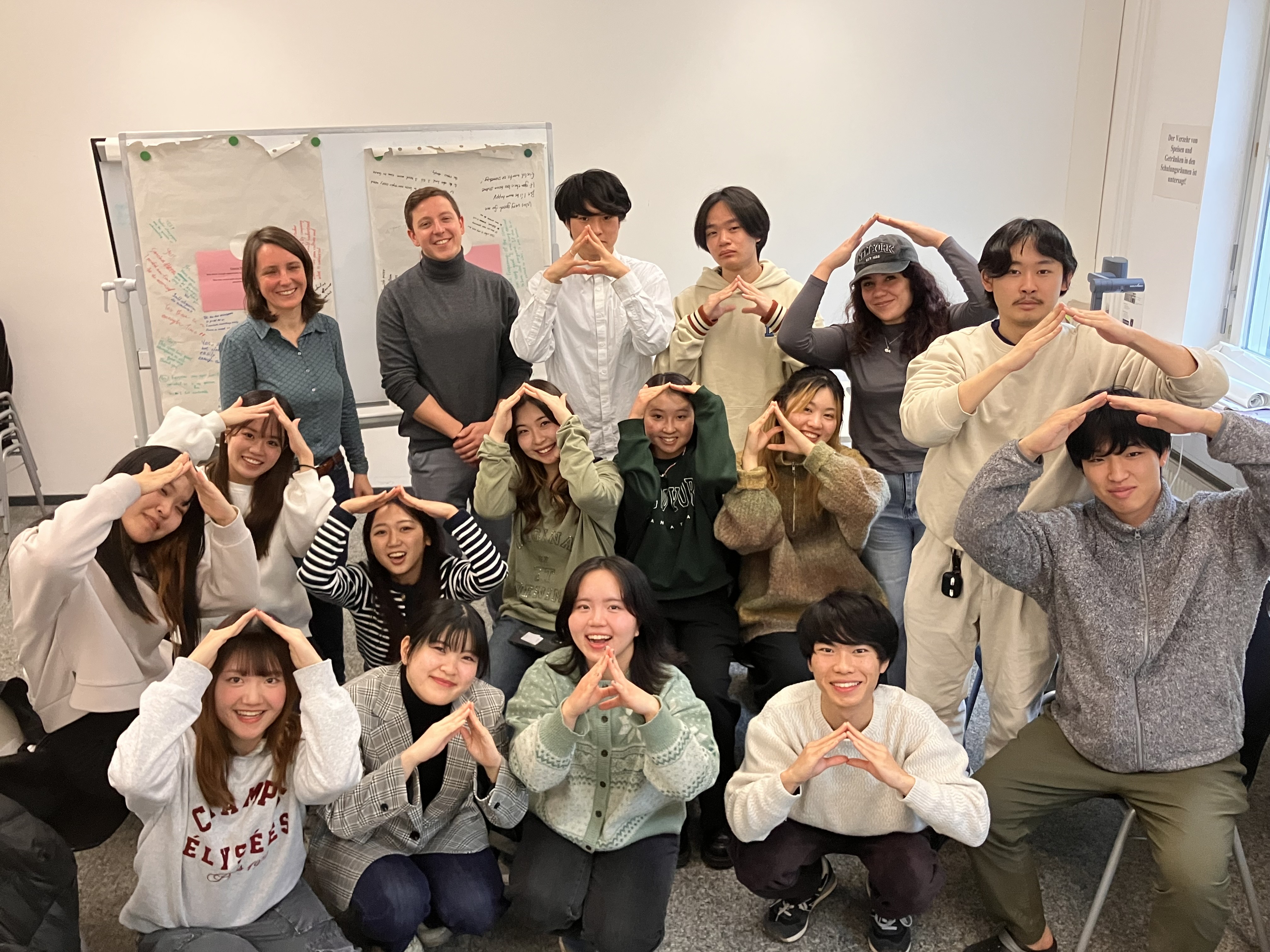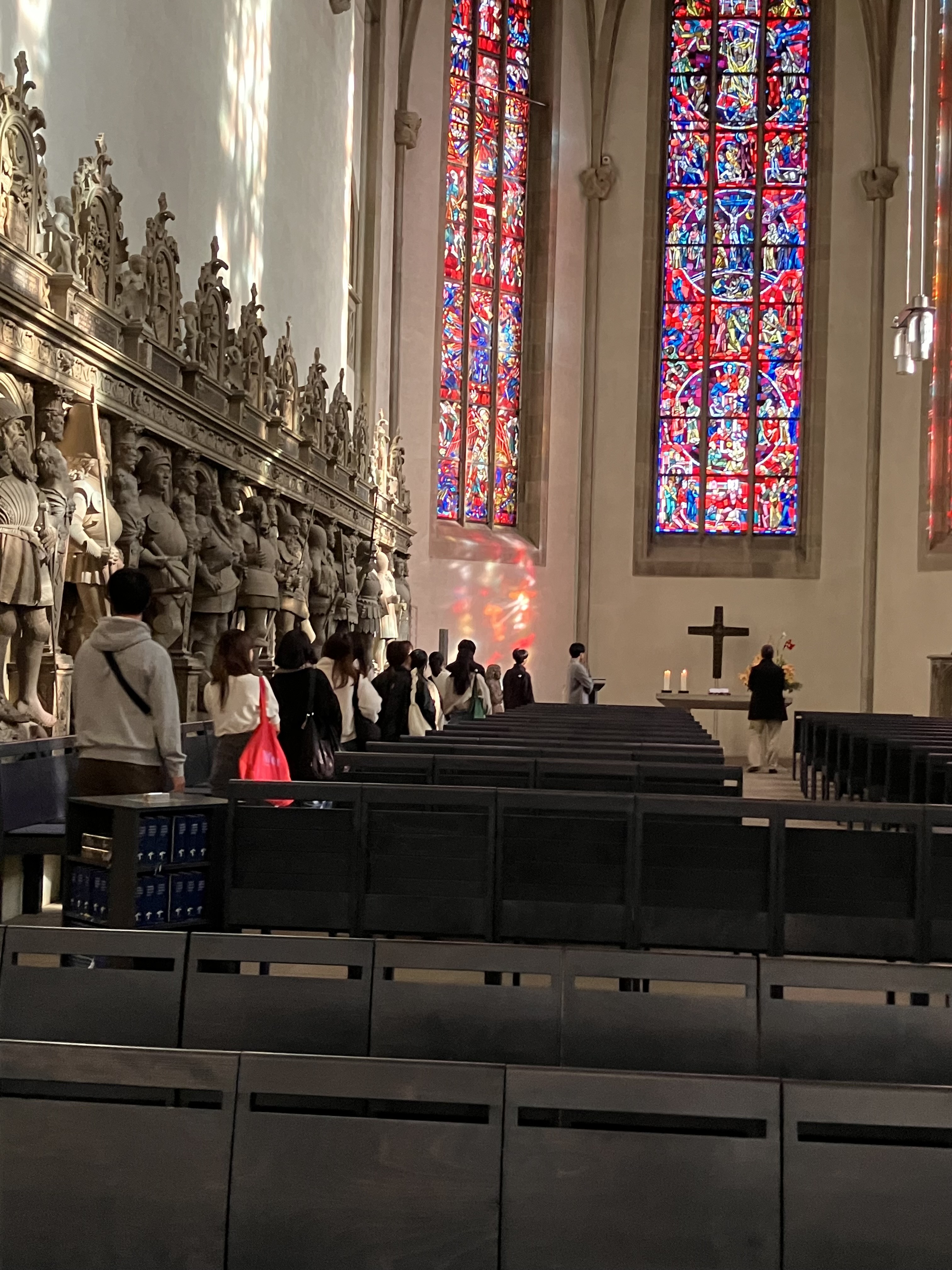On March 11 (Tuesday) and 12 (Wednesday), 2025, Doshisha University, in collaboration with the University of Tübingen, held the 5th International Interdisciplinary Symposium. The symposium took place at the Kambaikan Hardy Hall and the Ryoshinkan R305 at Doshisha University.
The theme of this symposium was “Humans and AI: Coexistence and Conscience – Toward a Future Where Humans and AI Develop Together for the Improvement of Society.” Researchers from various fields at Doshisha University and the University of Tübingen engaged in multi-perspective discussions.
During the keynote speech at Kambaikan Hardy Hall, President Katsuhiro Kohara of Doshisha University delivered a lecture titled “AI and Conscience: From the Perspective of Religious and Cultural Diversity.” During his lecture, President Katsuhiro Kohara emphasized the importance of constructing environmental ethics in light of the ongoing societal shift from natural and cultural environments to a digital one. He discussed how this transition calls for thoughtful consideration of environmental ethics in the midst of these changes. Professor Katja Schenke-Layland, Designated Vice President of the University of Tübingen, spoke about the Tübingen AI Center, a hub for AI in Europe, and the ELLIS-Institute Tübingen, a European network of excellence focusing on fundamental science, technological innovation, and societal impact. She highlighted how these initiatives are creating excellent research environments to attract top-level machine learning researchers from around the world.
In Panel 1, discussions were held on the transformative effects of large language models (LLMs) on communication and community-building, social robots and their role in communication, and the potential of AI’s massive visual data processing and modeling of neural processes. Ethical challenges in communication were also discussed.
On the following day, Panel 2 focused on the applications and developments of AI in space technology and medical sciences, while Panel 3 addressed legal issues surrounding regulation in marketing and organoid intelligence.
The symposium saw a total of 110 participants, including graduate students, engaging in lively discussions. New connections were formed in each of the thematic panels. The DU-UT Symposium is expected to contribute to the further development of research collaboration between both institutions.
Program
Keynote Lecture I
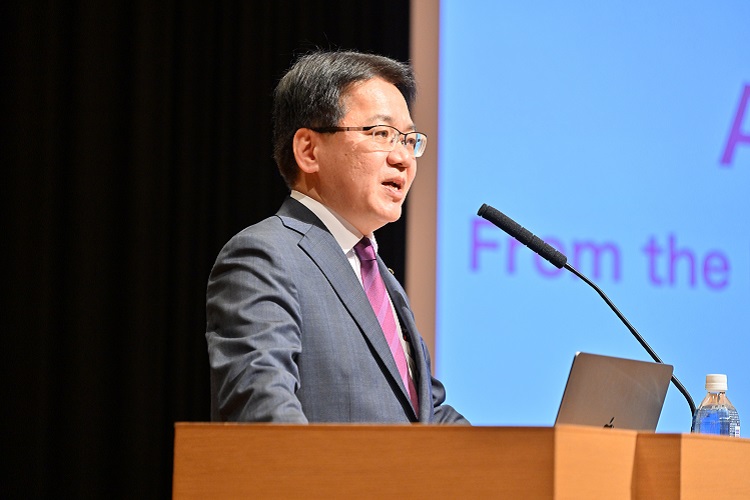
“AI and Conscience: From the Perspective of Religio-cultural Diversity”
Professor Katsuhiro KOHARA, Th.D., President, Doshisha University
Keynote Lecture II
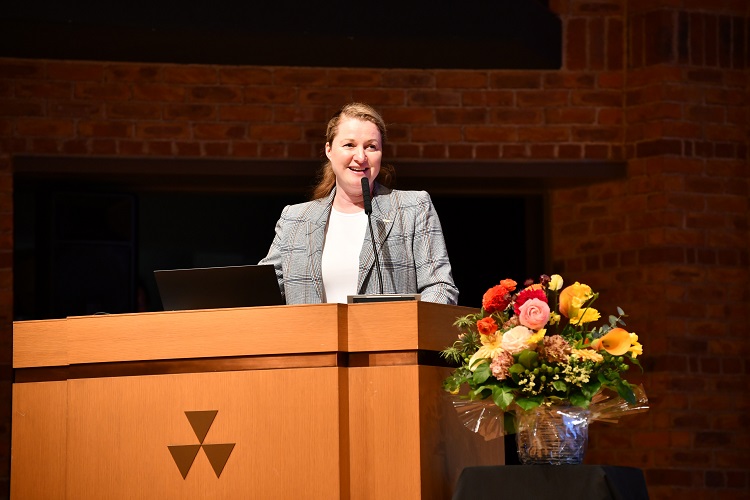
“Artificial Intelligence in Tübingen – Highlights and Perspectives”
Professor Dr. Katja SCHENKE-LAYLAND, Designated Vice President, University of Tübingen.
Discussion
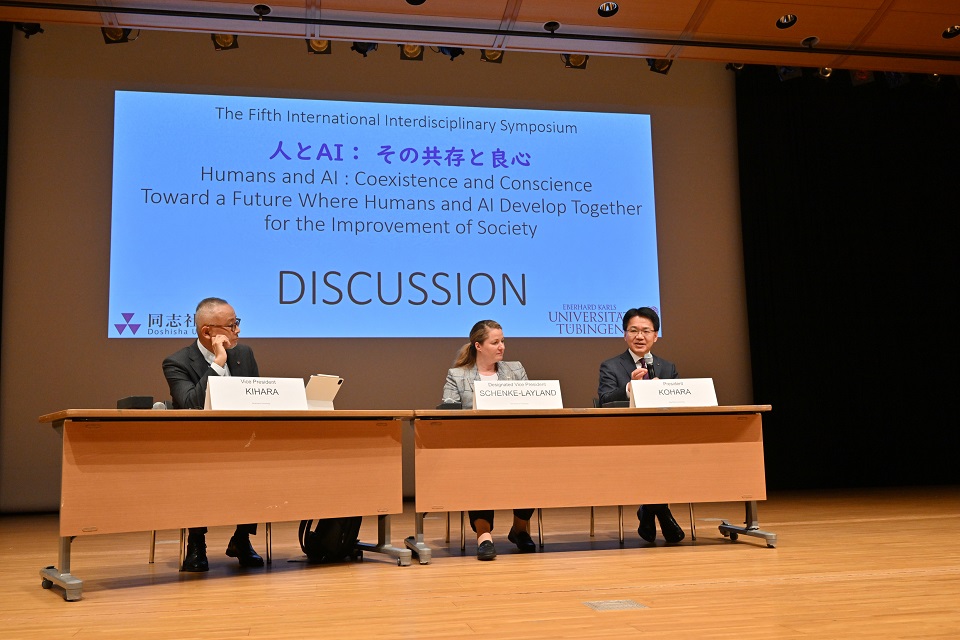
Professor Katsunobu KIHARA, Ph.D., Vice President, Doshisha University
Professor Dr. Katja SCHENKE-LAYLAND, Designated Vice President, University of Tübingen.
Professor Katsuhiro KOHARA, Th.D., President, Doshisha University
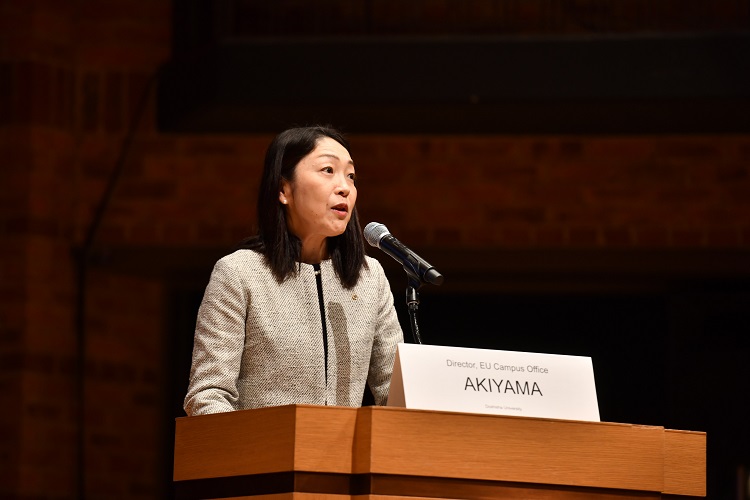
Professor Yoko AKIYAMA, Ph.D.
Director, Doshisha EU Campus at Tübingen University
Panel Ⅰ 【Humans and AI】
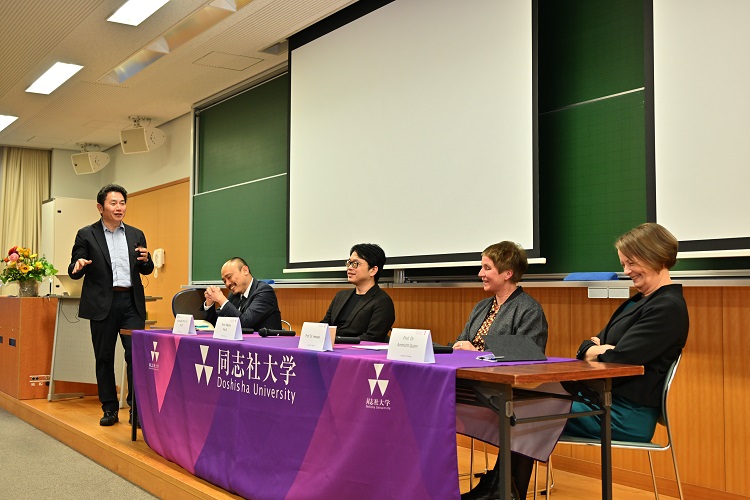
Professor Tomoyuki HIROYASU, Ph.D.
Associate Professor Takamasa IIO, Ph.D.
Professor Teppei MATSUI, Ph.D.
Professor Dr. Jessica HEESEN
Professor Dr. Regina AMMICHT QUINN
Panel II 【AI in Space Technology】
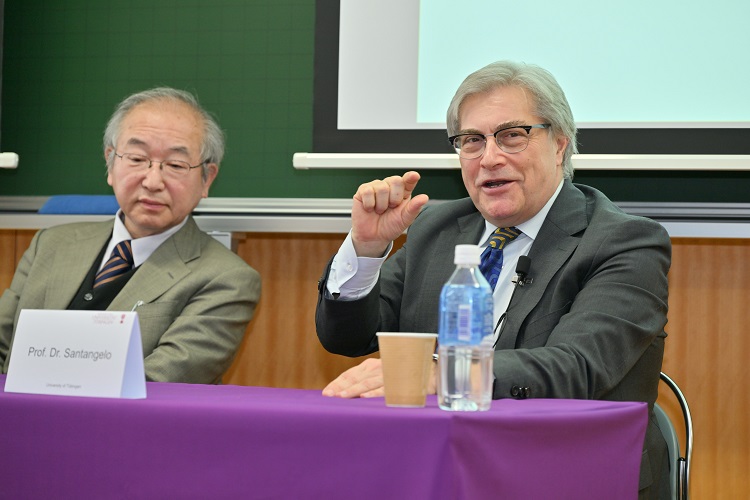
Visiting Professor Kazunari SHIBATA, Ph.D.
Professor Dr. Andrea SANTANGELO
Panel II 【AI in Medical Sciences】
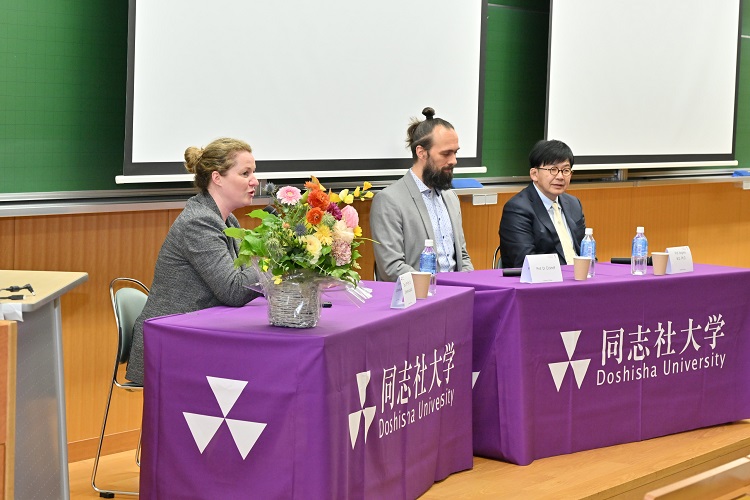
Professor Dr. Katja SCHENKE-LAYLAND
Professor Dr. Carsten EICKHOFF
Professor Masaya IKEGAWA, M.D., Ph.D.
Panel III 【AI and Legal Challenges】
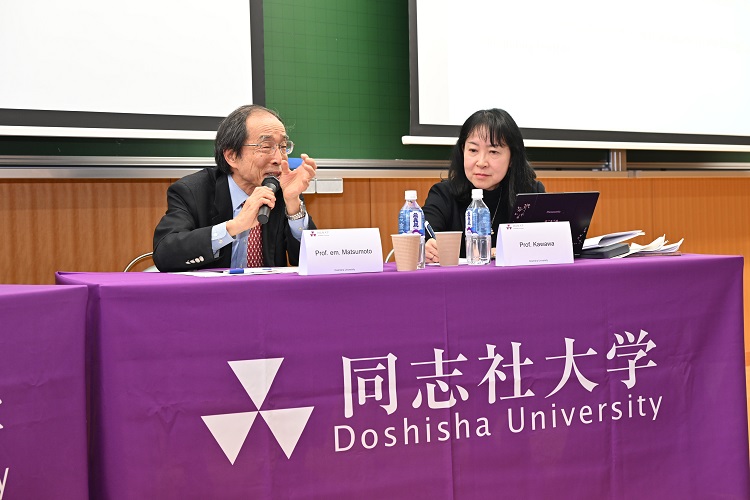
Professor Tsuneo MATSUMOTO
Professor Noriko KAWAWA
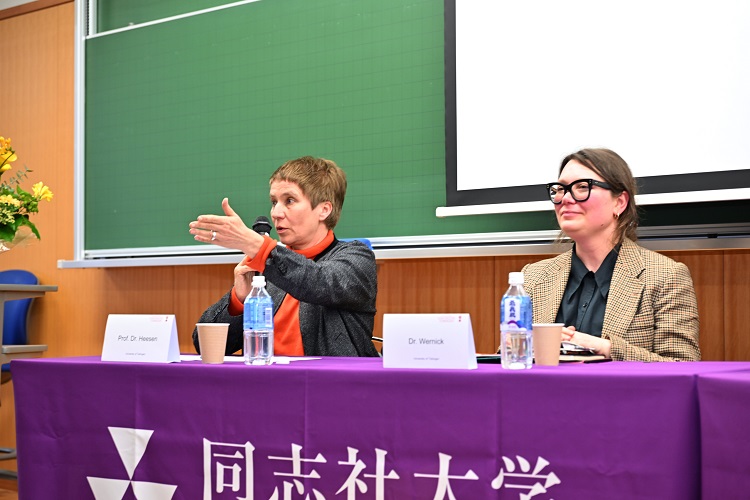
Professor Dr. Jessica HEESEN
Dr. Alina WERNICK
Group photo
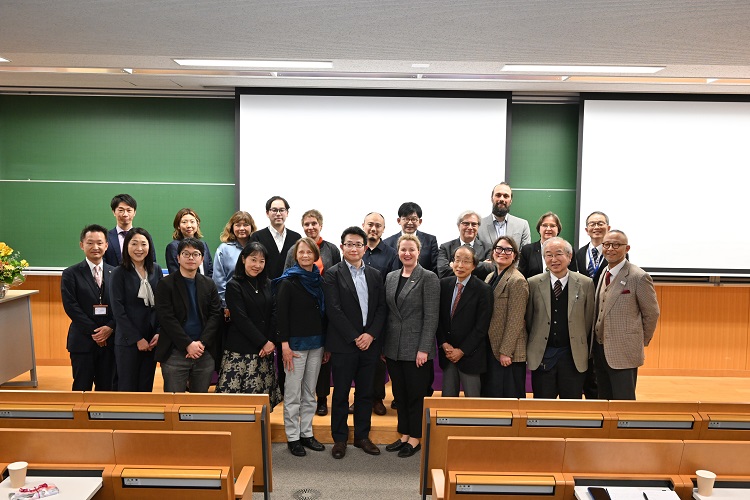
| Media contact |
Organization for Research Initiatives & Development Doshisha UniversityKyotanabe, Kyoto 610-0394, JAPAN |
|---|
From September 2nd, 2024 to January 17th, 2025, the third-year European Studies EU Campus Program was conducted at the EU Campus. Fifteen students from the Faculty of Sociology, Faculty of Law, Faculty of Economics, Faculty of Policy Studies, Faculty of Culture and Information Science, Faculty of Health and Sports Science, and Faculty of Global and Regional Studies participated.
In courses offered by the University of Tübingen (Tübingen International and European Studies: T-IES courses), the students could actively participate in small-sized classes with lectures, group work and discussions. Some students from University of Tübingen also joined the courses, which led the Japanese students to realize new perspectives and be exposed to a different ways of thinking. Since they had not experienced the similar learning environment in Japan, it facilitated their deep understanding the course contents.
Each T-IES course included fieldwork, which was conducted at the Brandenburg Gate and the Berlin Wall (Berlin) as symbols of German unity, and public institutions such as the European Central Bank (Frankfurt), and the European Council (Strasbourg). Additionally, visits were made to Ritter Sport, a German chocolate manufacturer aiming for a sustainable society, where students received explanations of corporate policies from employees. They also participated in workshops where they made chocolate themselves, gaining various perspectives through practical experience. In Stuttgart, students visited various religious institutions representing Christianity (Protestant and Catholic) and Islam, learning about the history and basic tenets of each religion and denomination. Through lectures by local faculty members, they deepened their understanding of various issues facing Germany and the EU from a multidisciplinary perspective encompassing culture, religion, society, politics, law, economics, environment, human rights, gender, immigration, and refugees.
Other than the academic courses mentioned above, the students also enjoyed extracurricular activities, especially Buddy Program. Each Japanese student had their own Buddy, a UT student and could interact with and learn about German culture through their Buddy. This program helped the students smoothly settle into a new environment and to build valuable relationships and memories with their Buddy.
We are sincerely grateful to the T-IES team, who were always engaged in delivering and improving the program, and provided such an attractive opportunity for the students.
*We have published articles
written by participating students during the program period, titled
"Student Voice" on the EU Campus website in both Japanese and English.
Please refer to the link below for more information.
The Global Leadership Program, a short-term study abroad program of Korea University, one of the most prestigious private universities in South Korea, was held at Doshisha University Imadegawa Campus for about three weeks from January 20 to February 7, 2025, and 19 international students studied at our university.
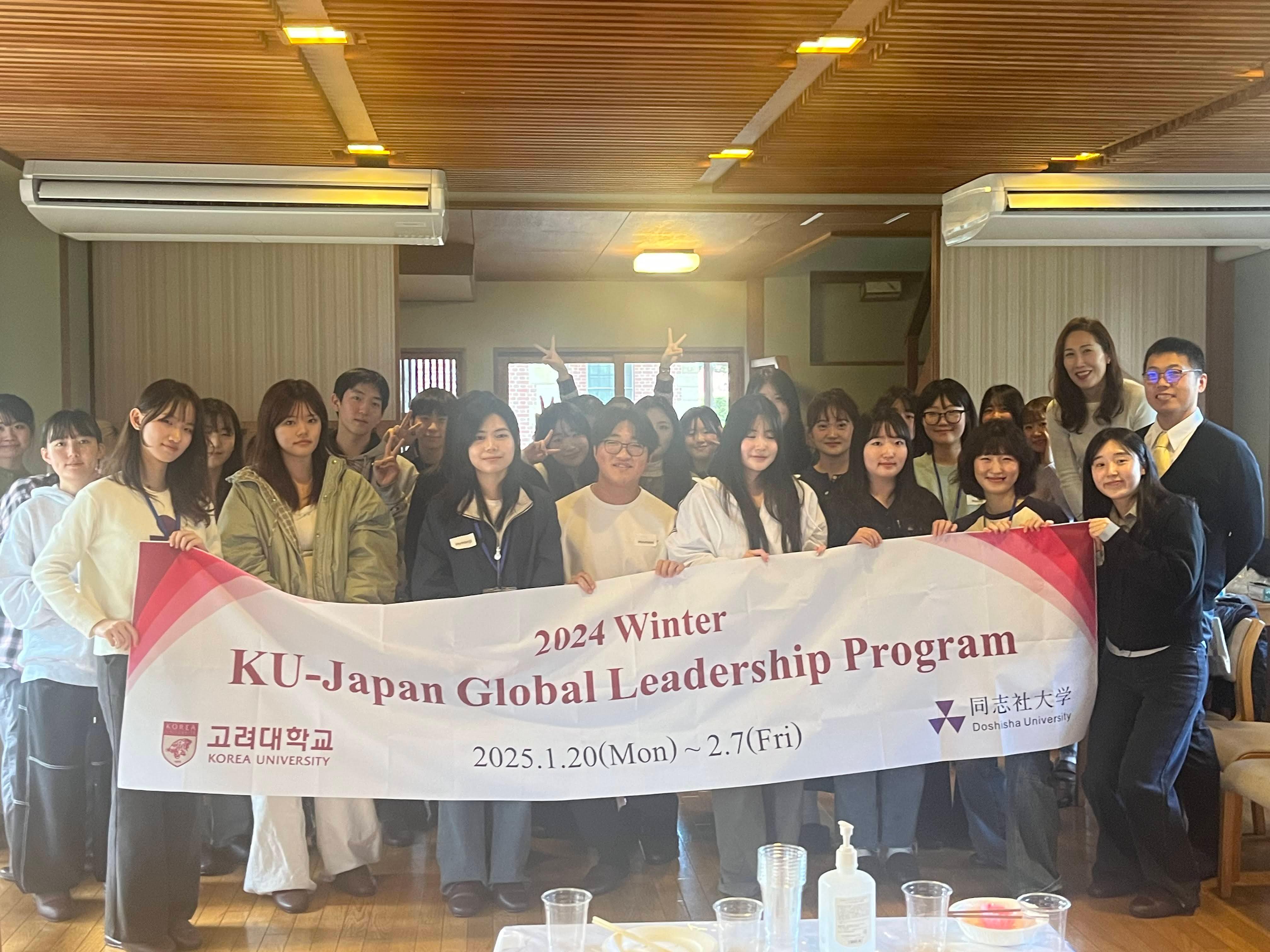
In this program, Japanese language classes are thoroughly taught by faculty members of the Center for Japanese Language and Culture at TUFS. There are many daily assignments, and every year many Korea University students have mastered the Japanese language and deepened their understanding of Japanese culture. And it's not just about the language. The program also includes various hands-on learning experiences that are only possible in Japan, such as a Zen meditation experience, and an aikido experience. One of the most attractive aspects of studying abroad is the chance to meet and interact with people. Many Doshisha students again participated in the program as supporters and study volunteers, assisting in classes, holding welcome and farewell parties, and making efforts to interact with the students on a daily basis. They helped the students with conversation practice and presentation preparation, and deepened their friendship with the international students by interacting with them as young people outside of the study program.
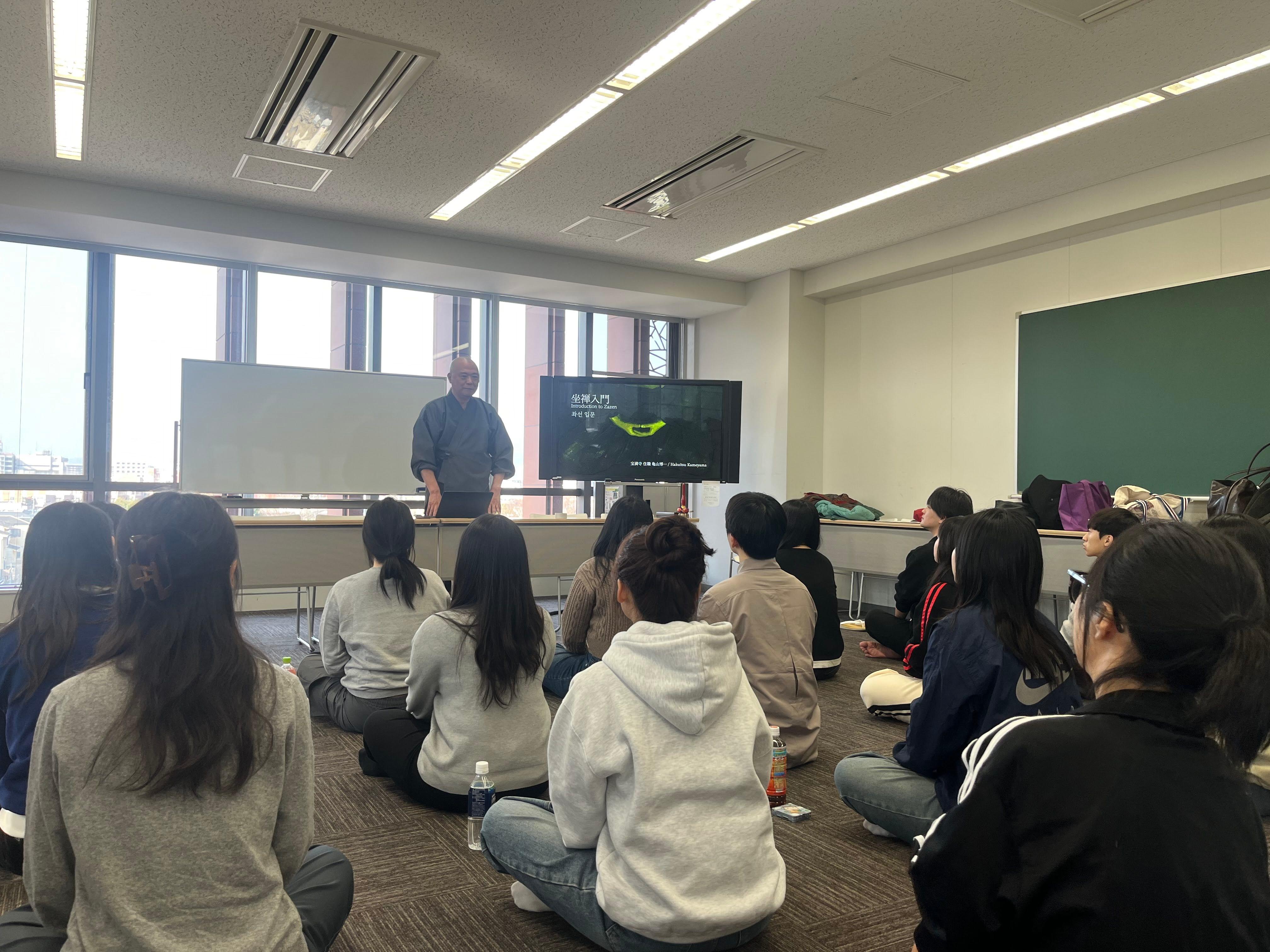
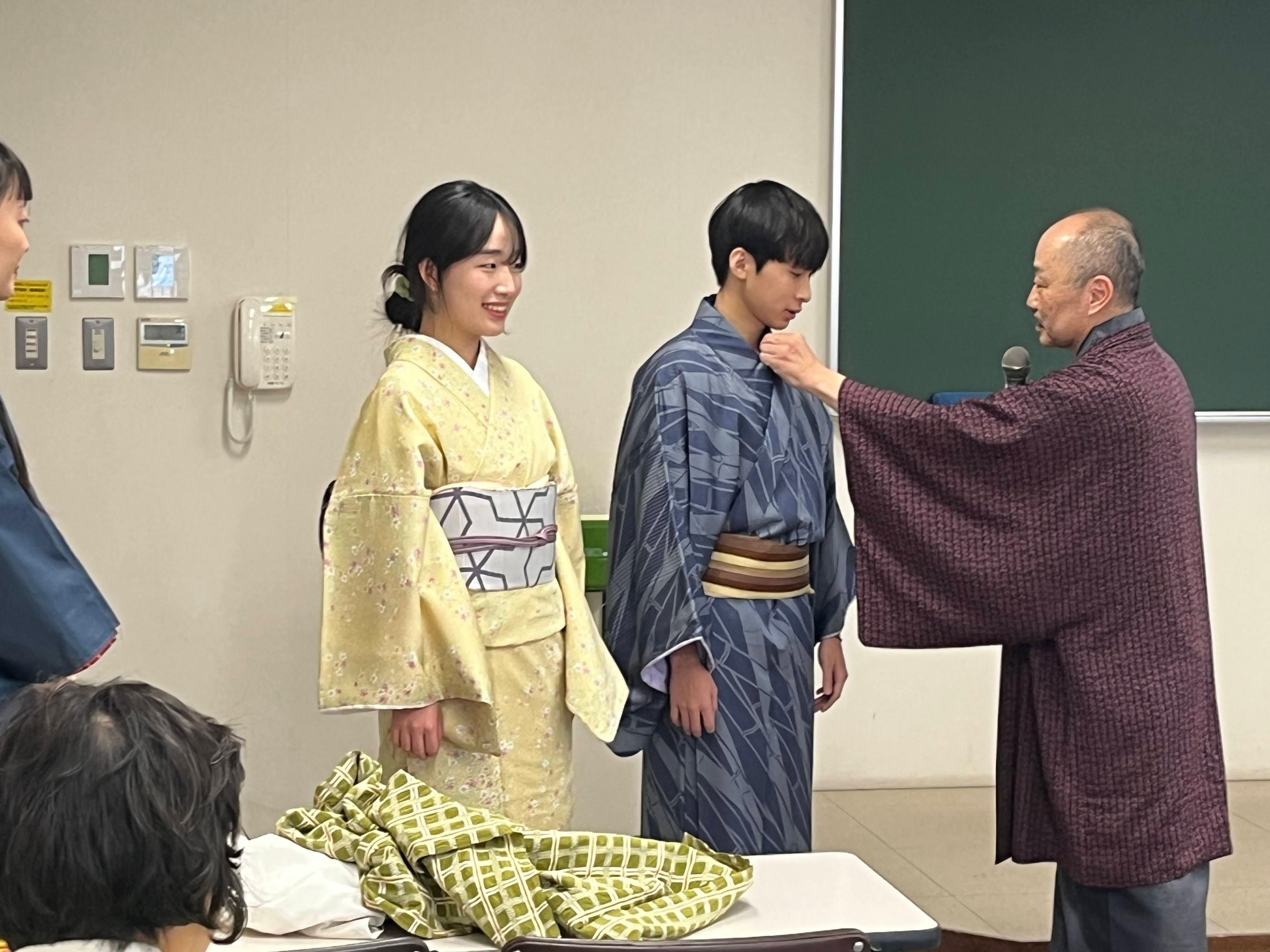
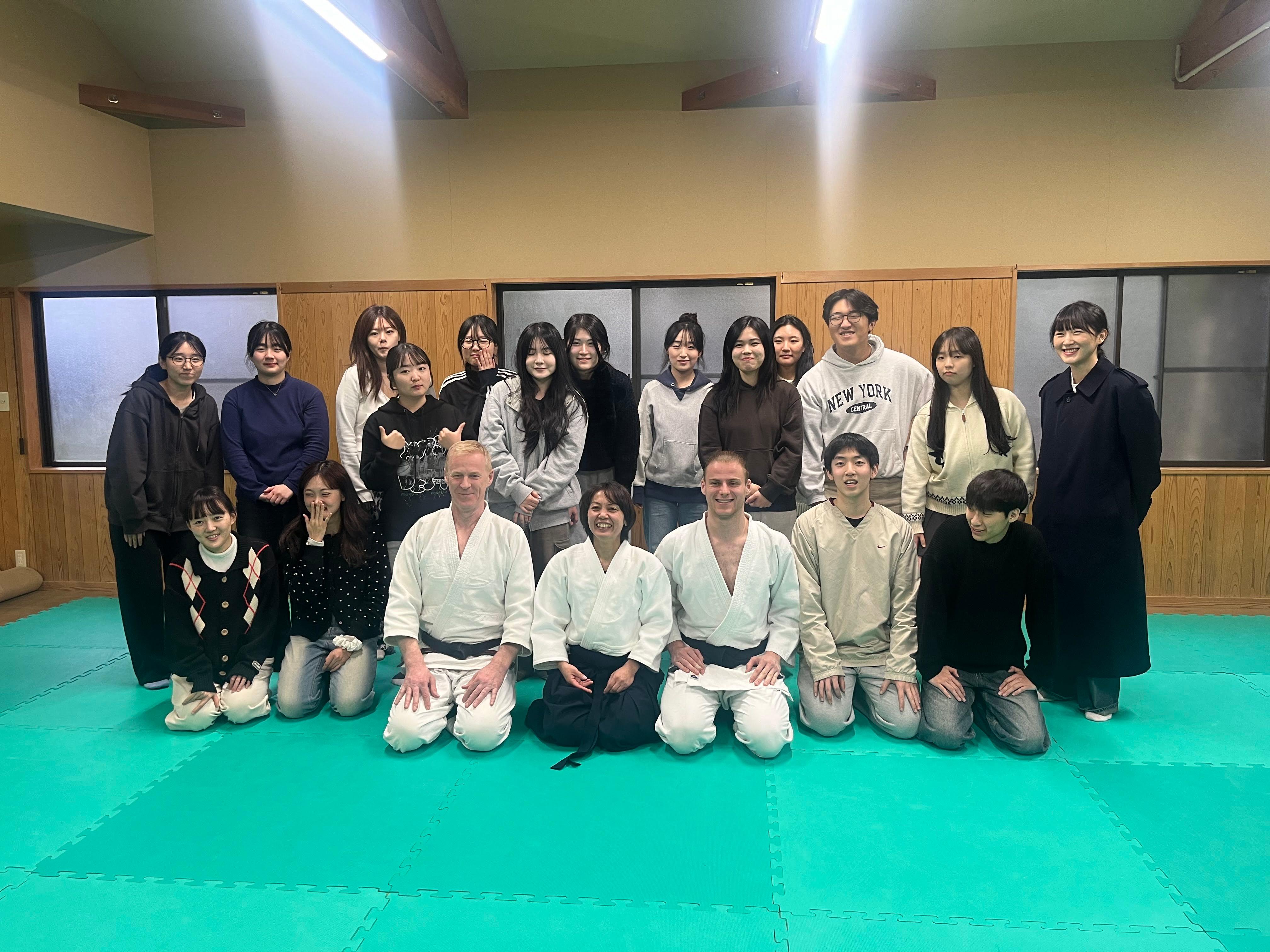
On the final day of the program, the participants gave presentations on themes related to Japan that they had chosen. The students prepared presentation materials and gave their presentations entirely in Japanese, and the results of their studies over the past three weeks were fully demonstrated in their presentations. The themes were very original, and we listened to them with great interest.The final event of the day was the completion ceremony. Everyone received their certificates with smiles and poses. After the ceremony, it was time for the last exchange before returning home. It was impressive to see the international students and our student supporters enjoying conversation in Japanese and regretting their separation. 3 weeks was a short period of time, but it seems that the students were able to build friendships and have a wonderful influence on each other. We sincerely hope that the students of Korea University and Doshisha University who participated in this program will continue to strengthen their friendship and become a bridge between Korea and Japan and the world.
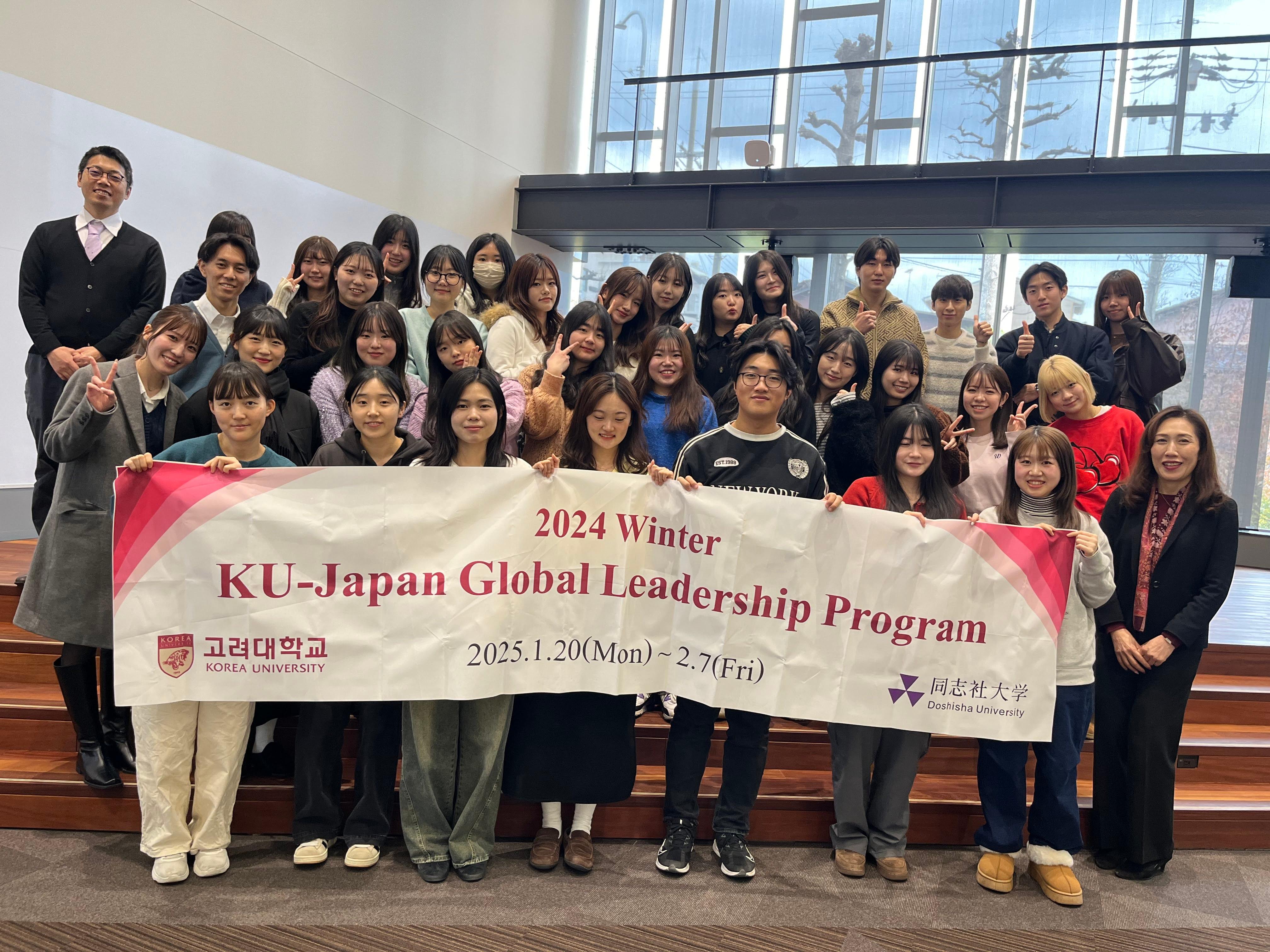
| Contact |
国際センター 留学生課 TEL:075-251-3257
|
|---|
We discovered many similarities, such as similar New Year games between Taiwan and Japan, which created a lively and enjoyable atmosphere.
The participants struggled to predict the placement and adjust the orientation of the facial parts, but many unique faces were created.
Throughout the event, there was constant conversation and laughter, and we were able to enjoy Fukuwarai in a warm and friendly atmosphere.
The staff was very pleased with how the event went.
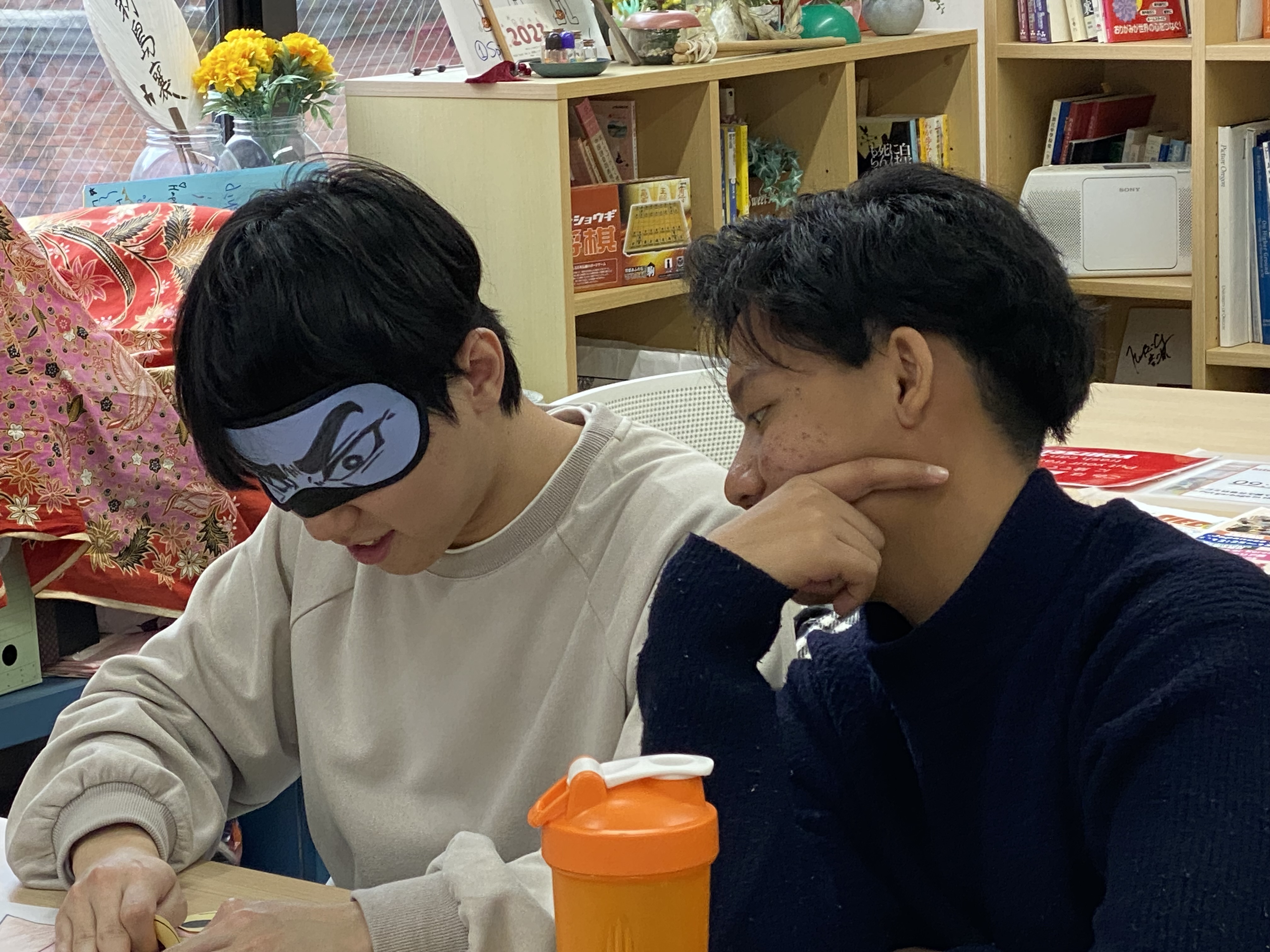
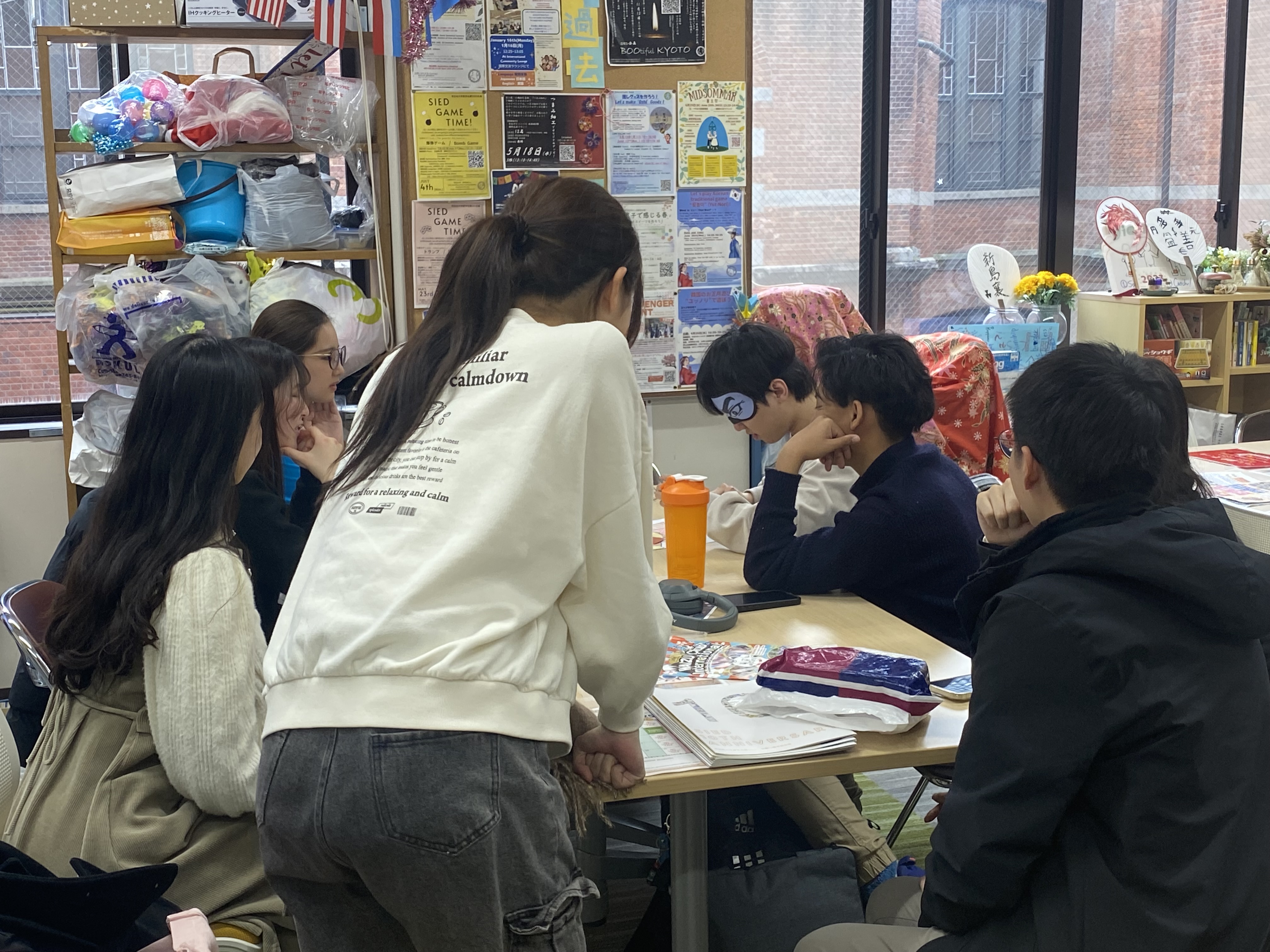
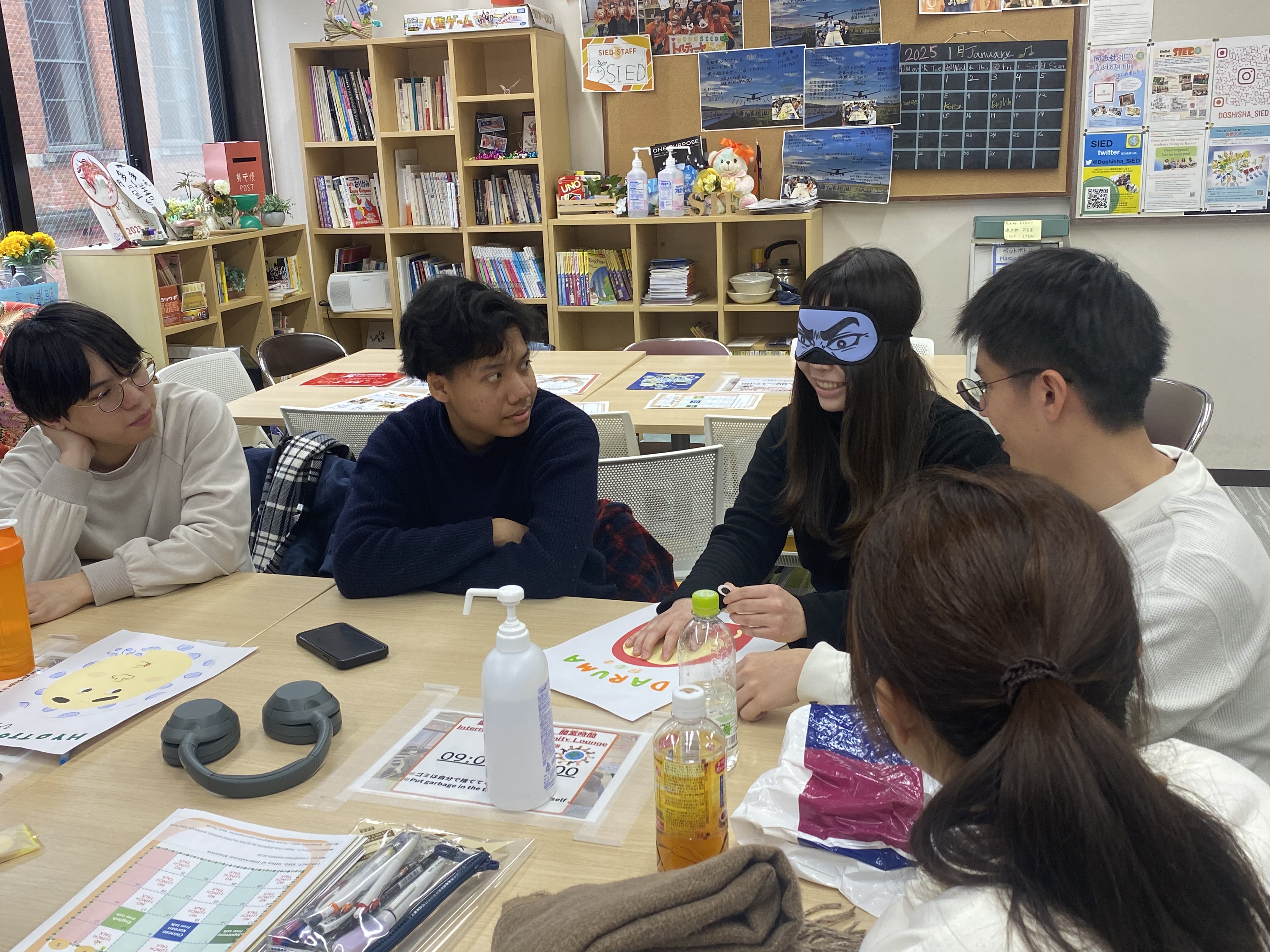
| Contact |
国際センター 留学生課 TEL:075-251-3257
|
|---|
Thanks to the many participants, the International Exchange Lounge was filled with energy and excitement.
The dance routines we tried during the event were simple, so even beginners could feel comfortable and enjoy themselves.
Additionally, SIED staff members also participated, dancing together with everyone.
It seems that even those meeting for the first time were able to bond and become friends through the dance.
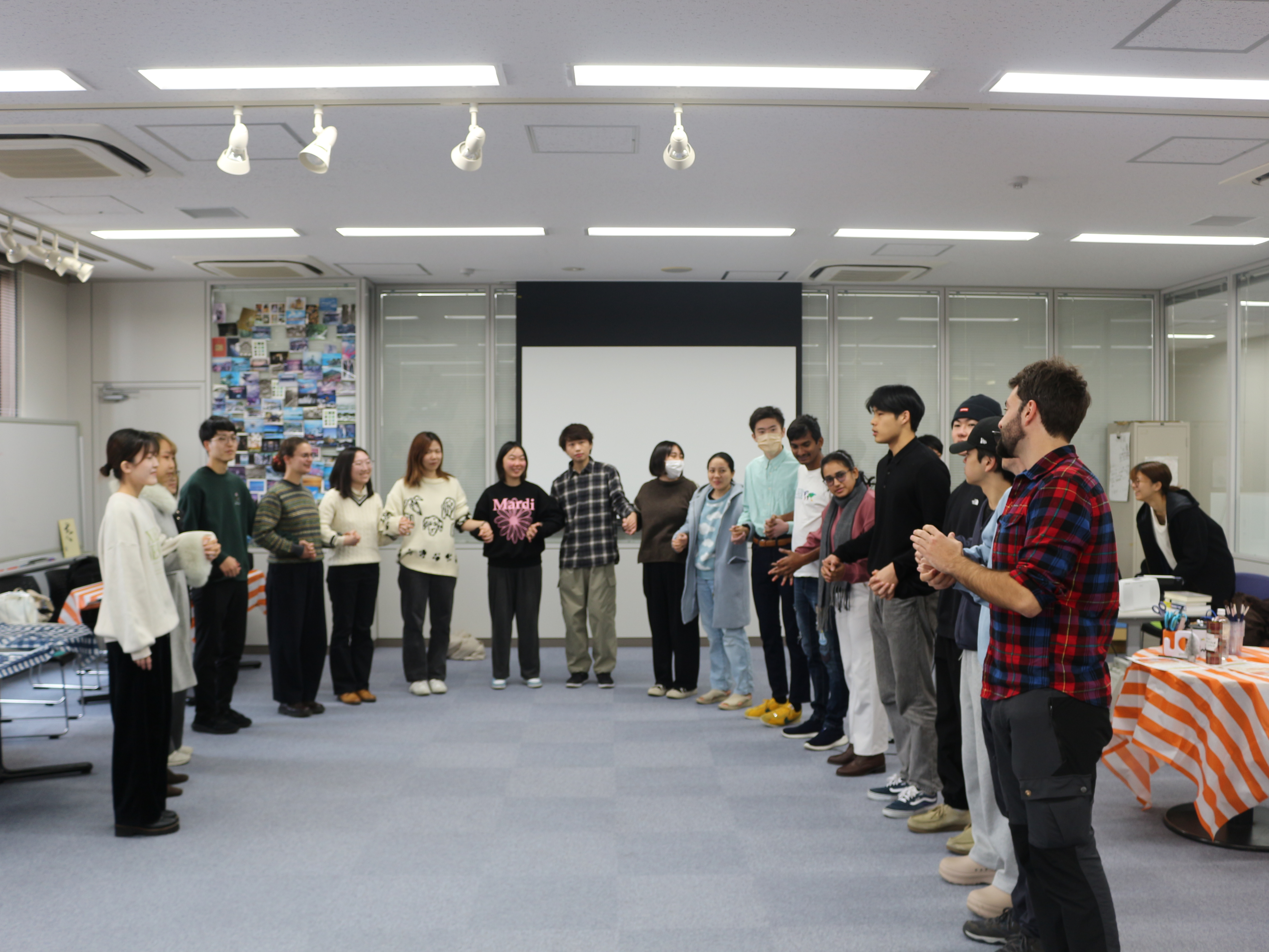
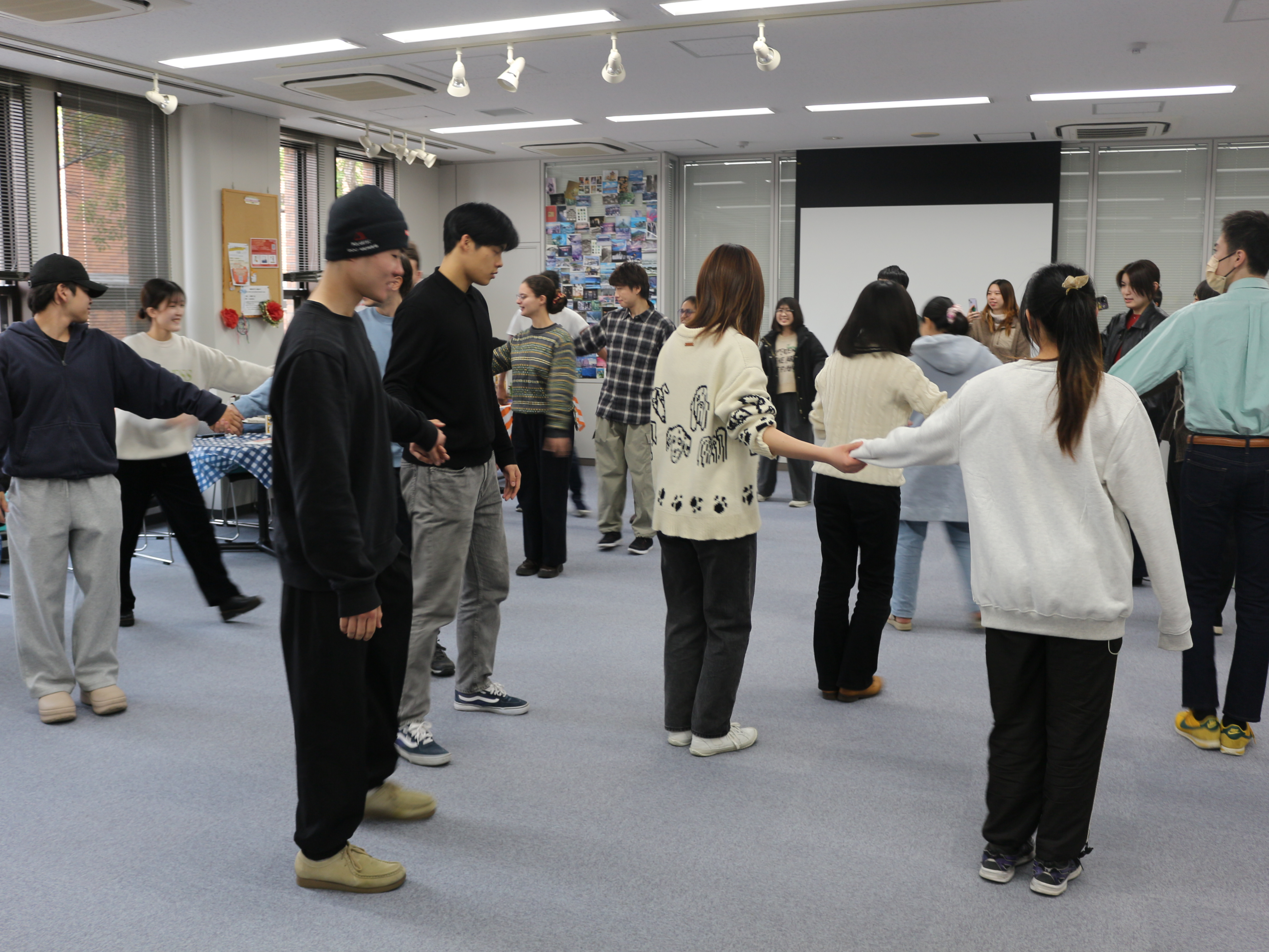
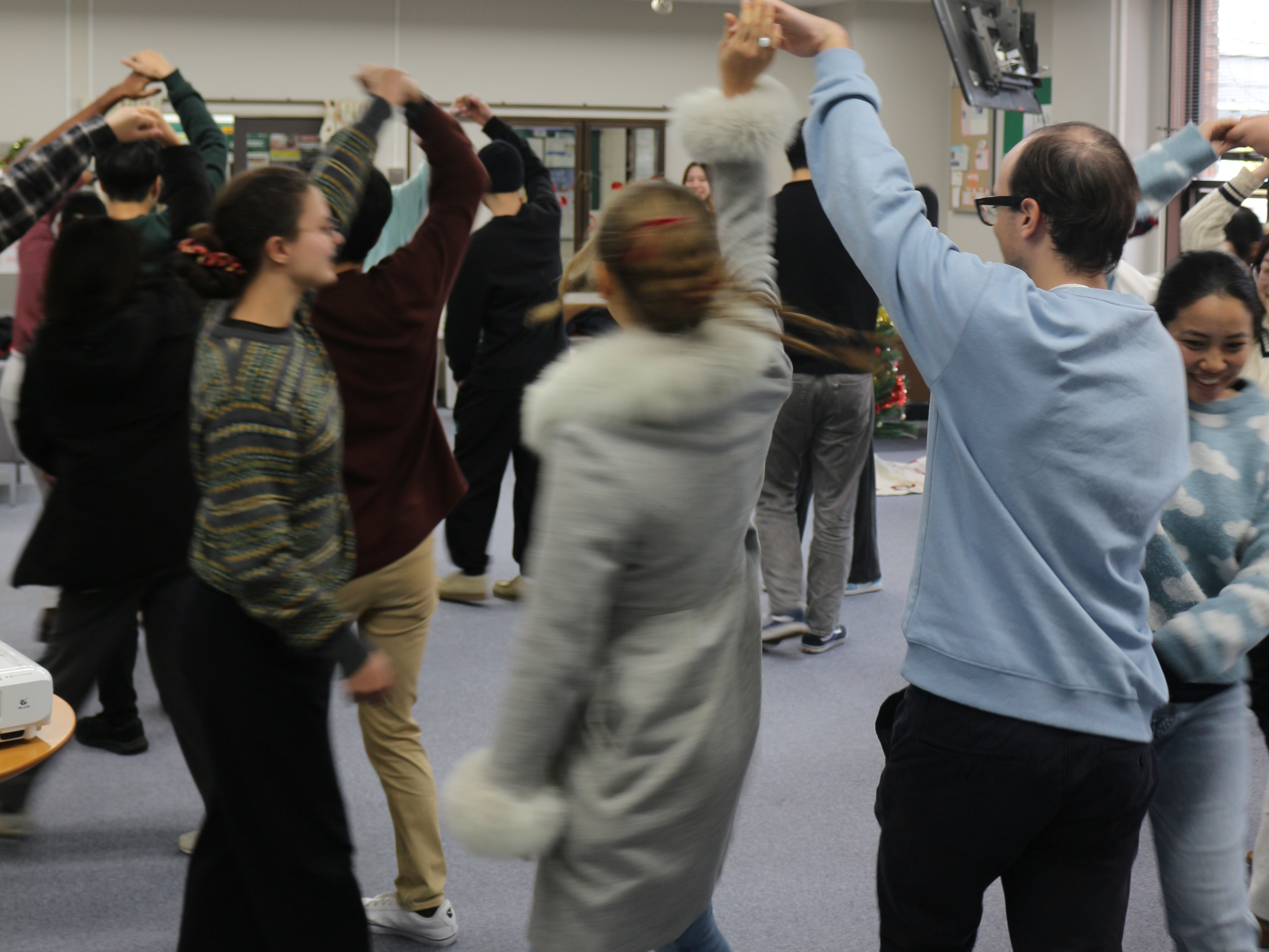
| Contact |
国際センター 留学生課(京田辺) TEL:0774-65-7453
|
|---|
This was the second installment of the “Let’s learn local Japanese culture!” series, following the spring semester’s Okinawa-themed event featuring star sand crafting.
Participants also shared information about their hometowns’ specialties, local festivals, and other unique features.
Interestingly, many participants turned out to be quite skilled, completing their pieces smoothly.
Some even adorned necklaces with denim feather motifs they made and wore them home after the event.
SIED will continue to organize a variety of international exchange events.
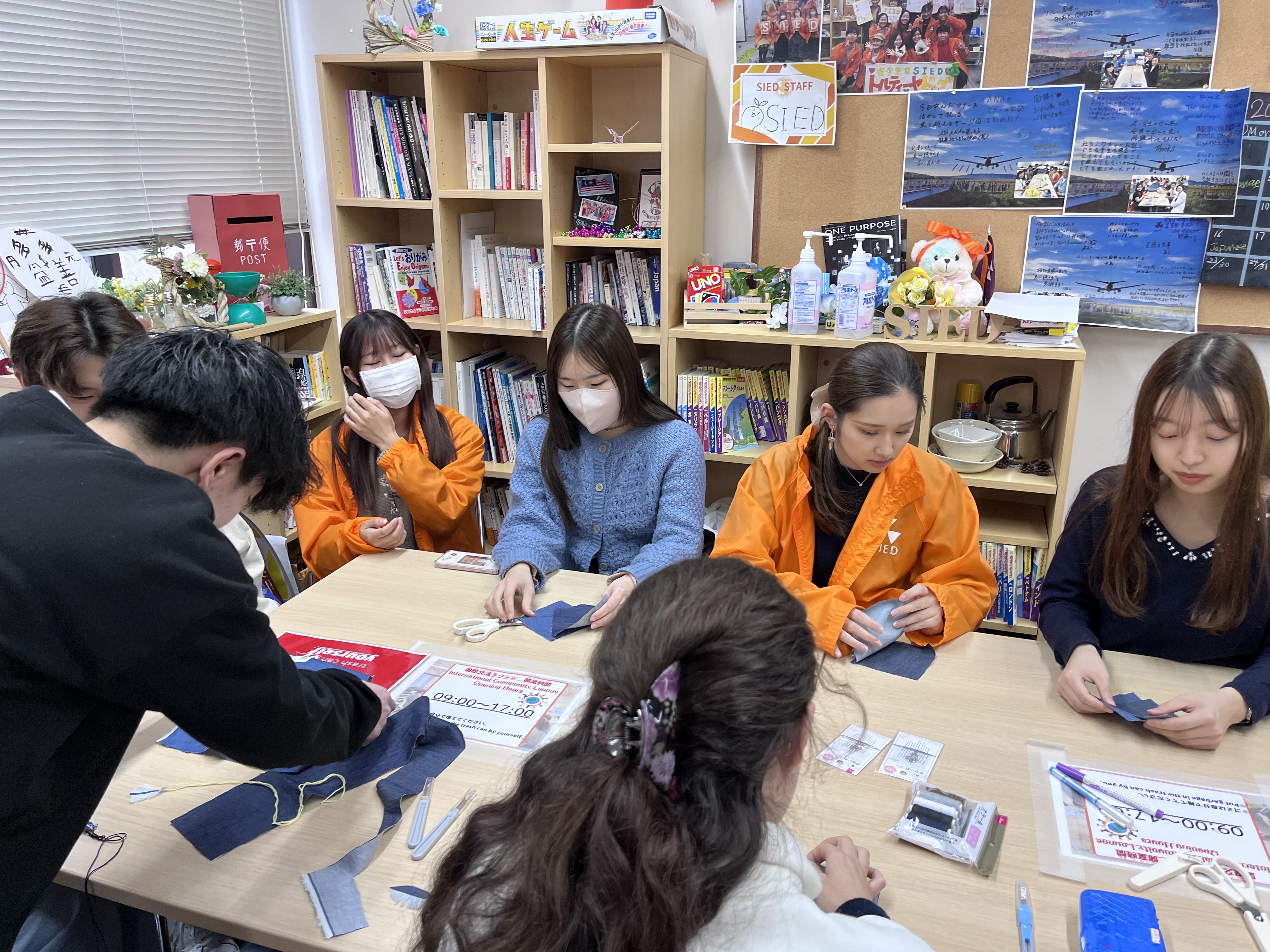
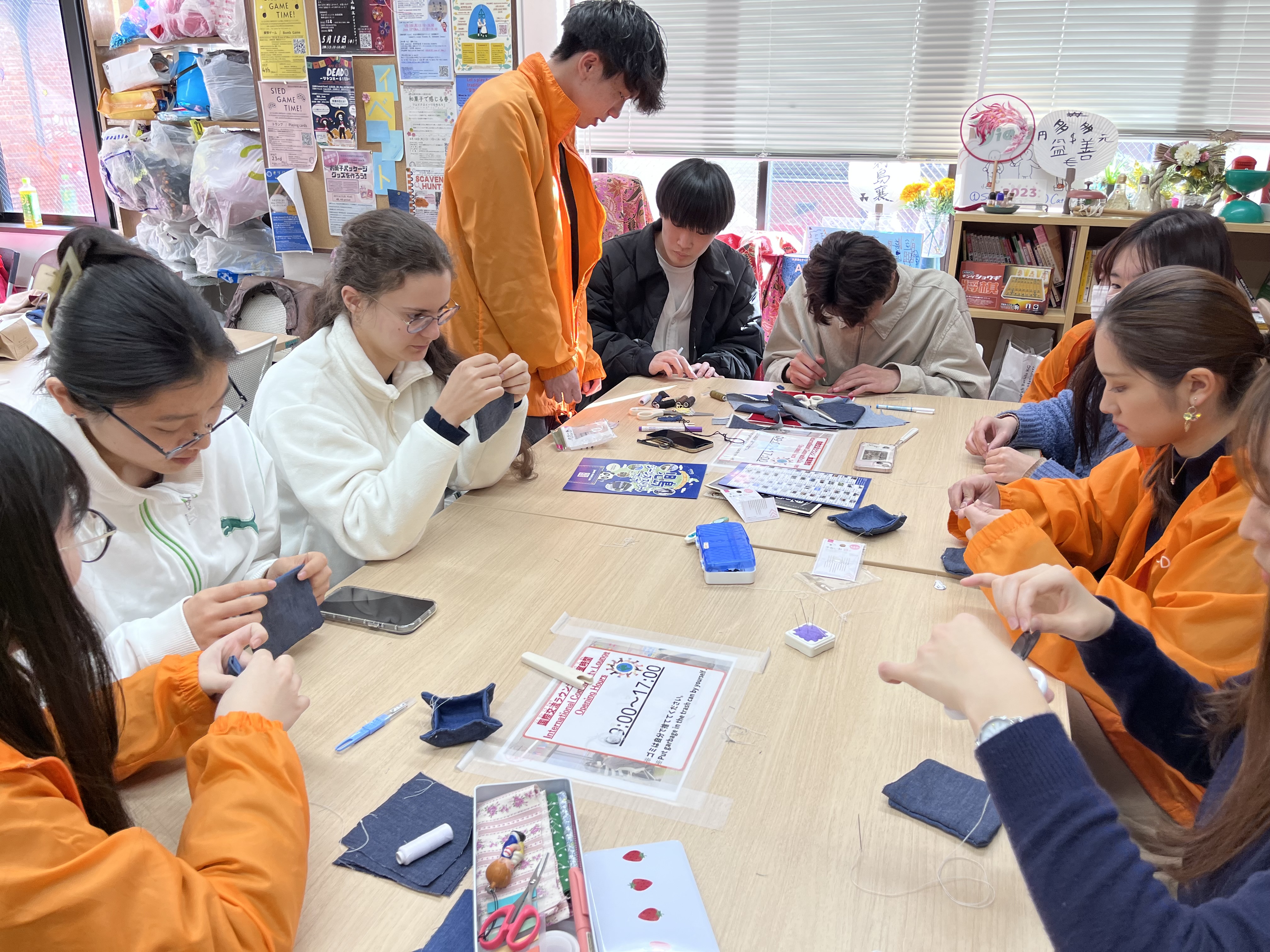
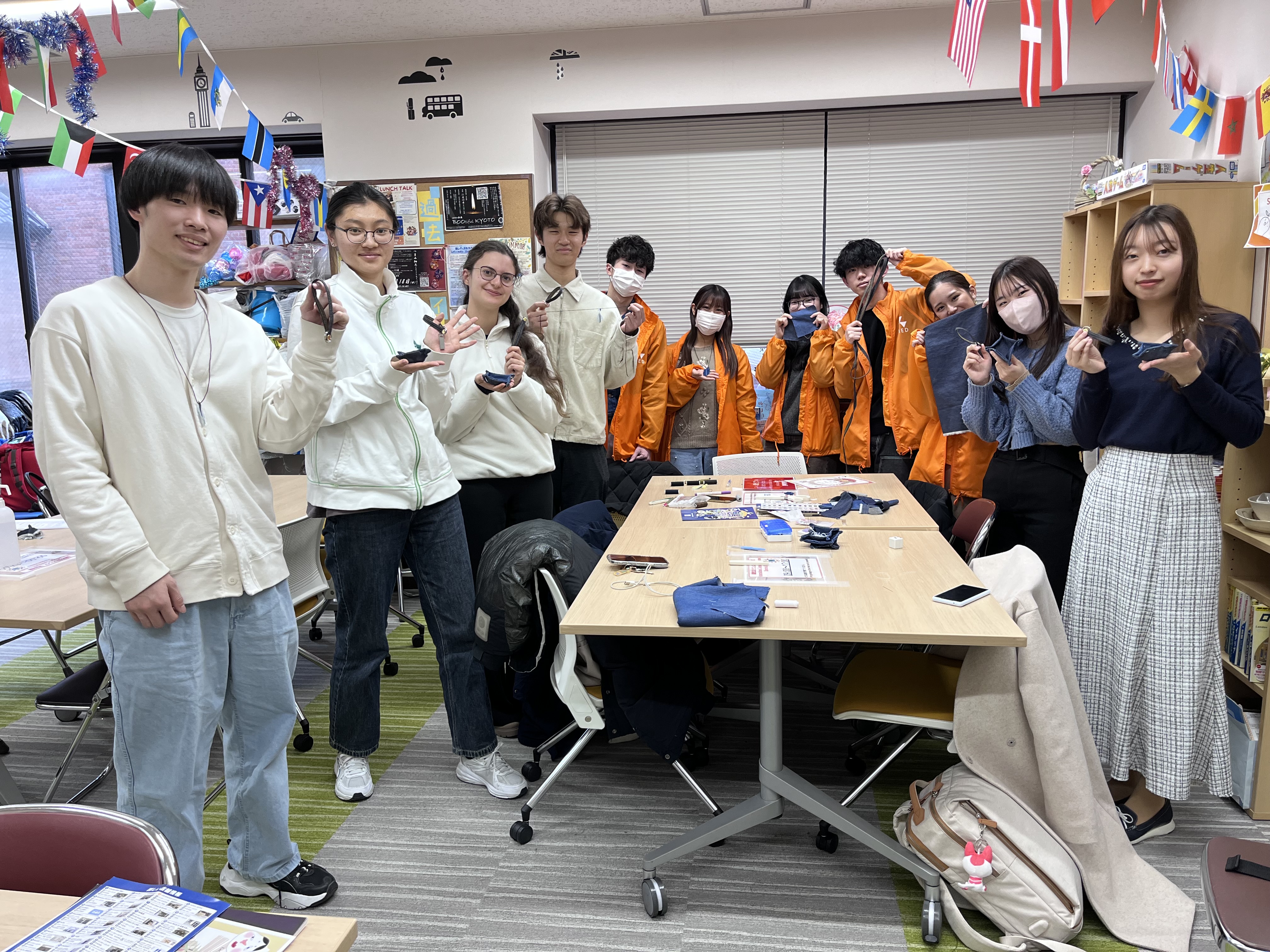
| Contact |
国際センター 留学生課 TEL:075-251-3257
|
|---|
It seemed that many of the participants favored Japanese artists.
After that, we held an activity where everyone contributed one line of lyrics, and together we created a song.
The song included lyrics in both Japanese and English, which resulted in a unique composition that transcended languages!
Since each participant came up with a different line, the song developed an unexpectedly intriguing storyline.
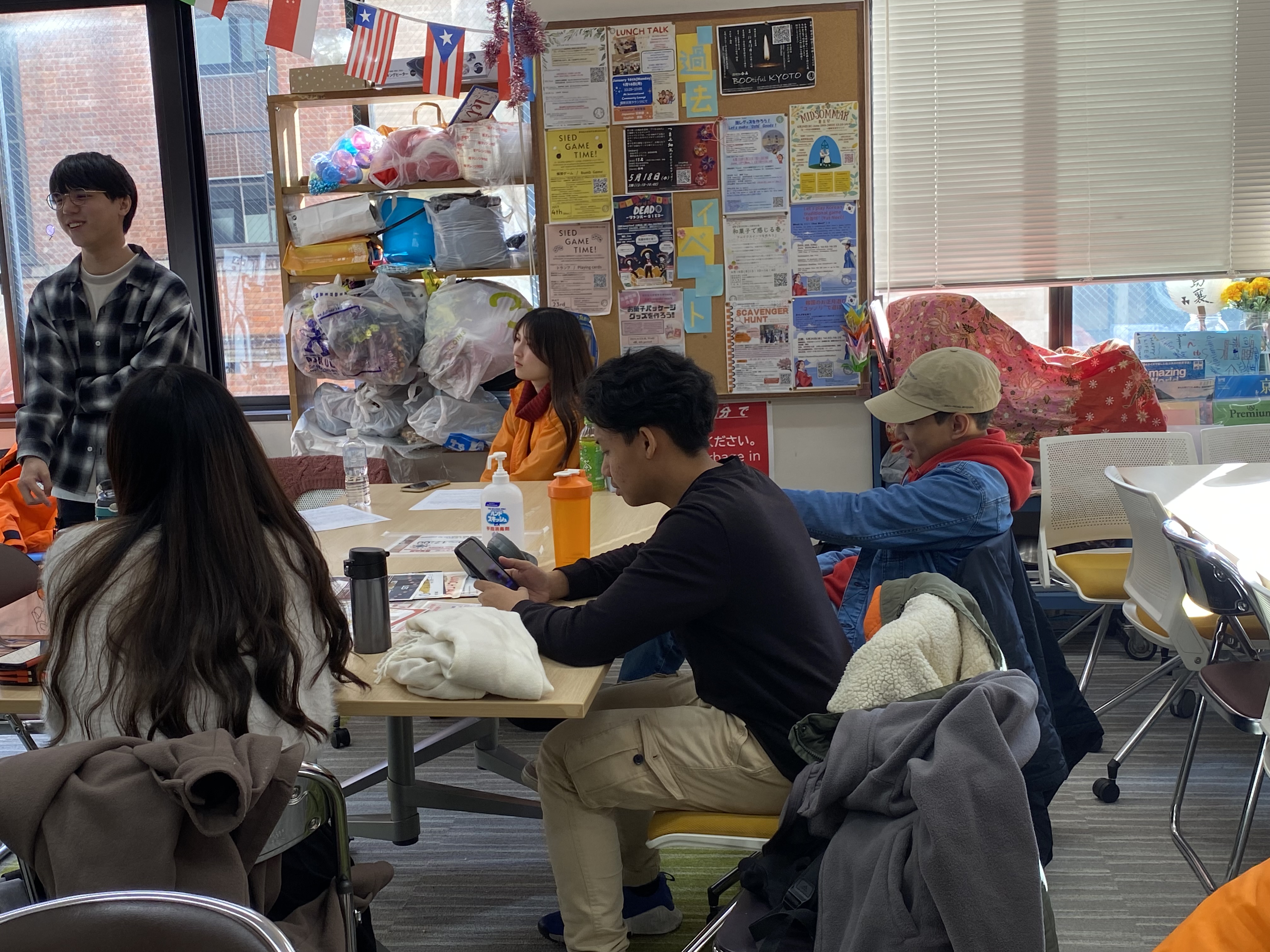
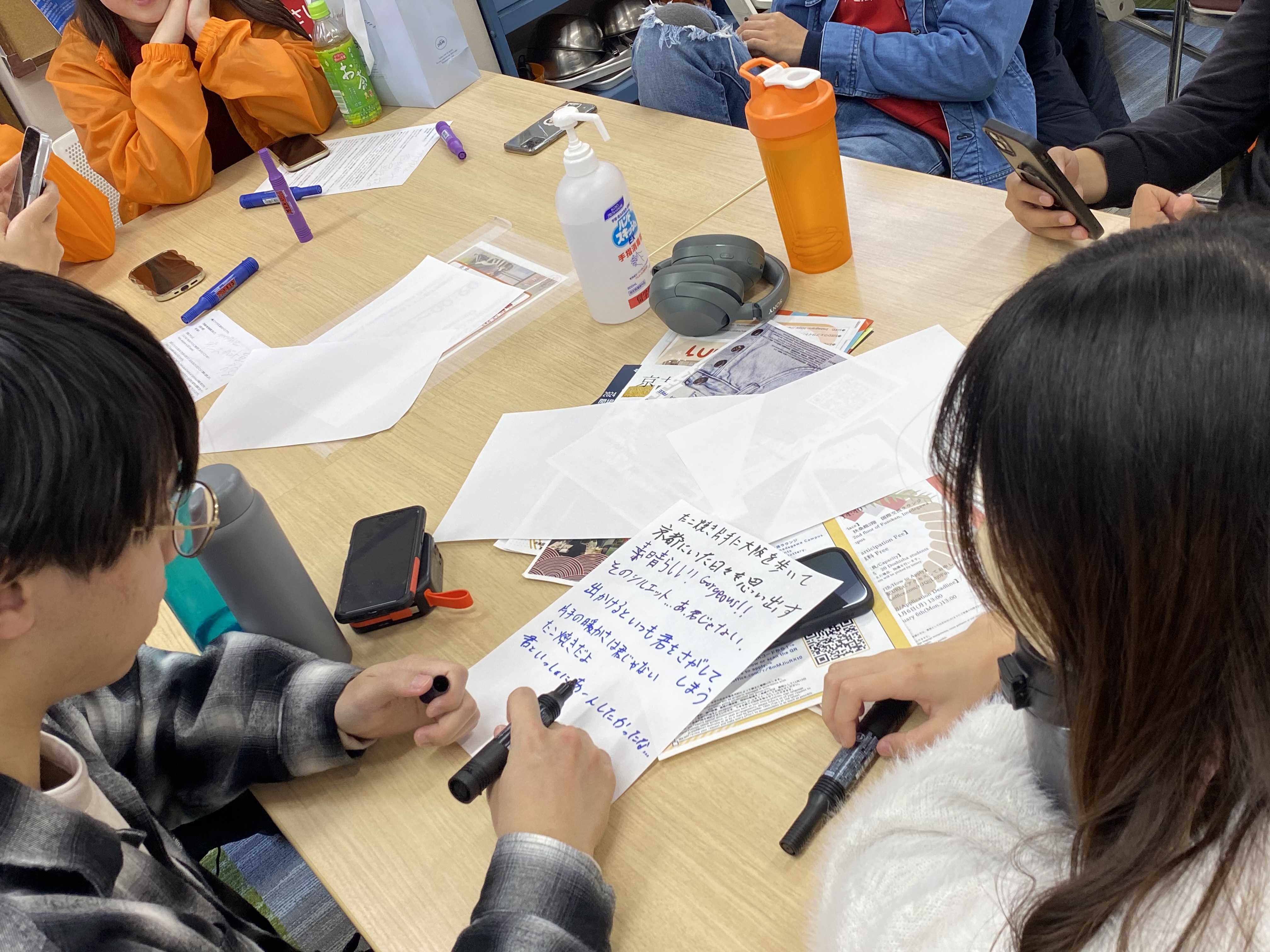
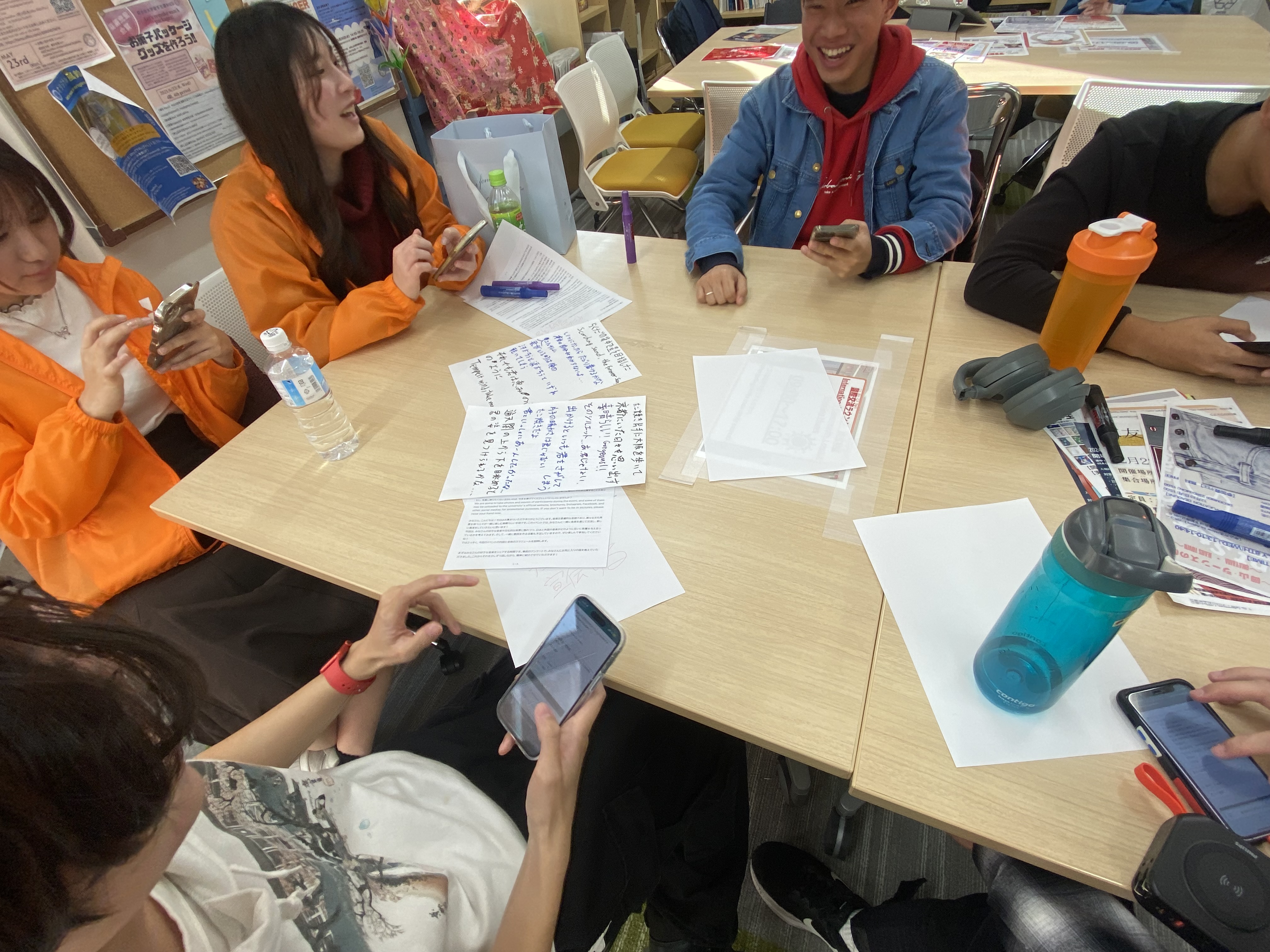
| Contact |
国際センター 留学生課 TEL:075-251-3257
|
|---|
At the beginning of the event, we had an icebreaker activity where participants shared how they usually spend the New Year.
Afterward, everyone selected their favorite decorations and enjoyed decorating the shimekazari while chatting with one another.
Some participants decorated their shimekazari simply with only mizuhiki, while others made their decorations colorful and elaborate by using various flowers.
In the end, everyone created their own unique shimenawa!
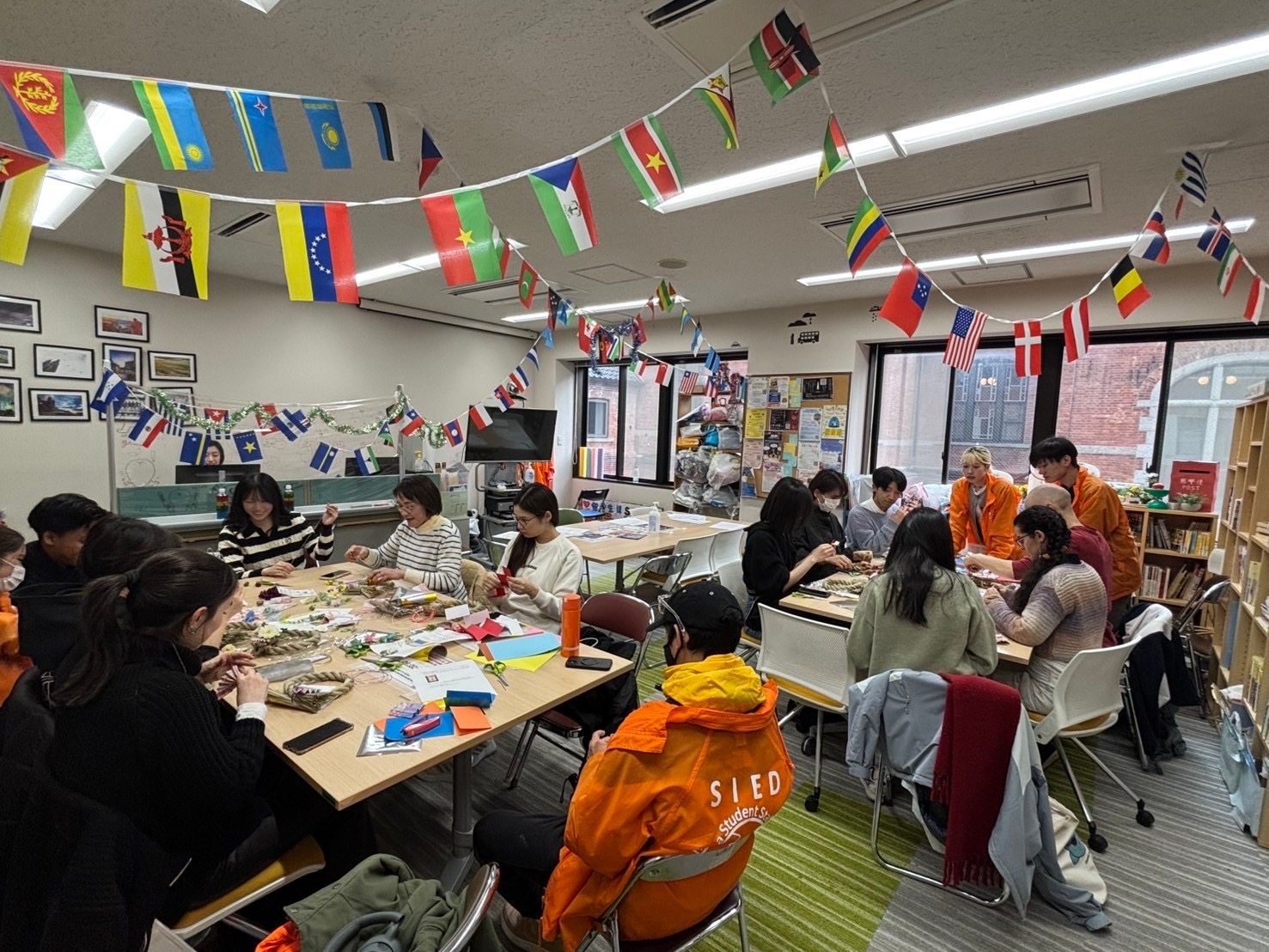
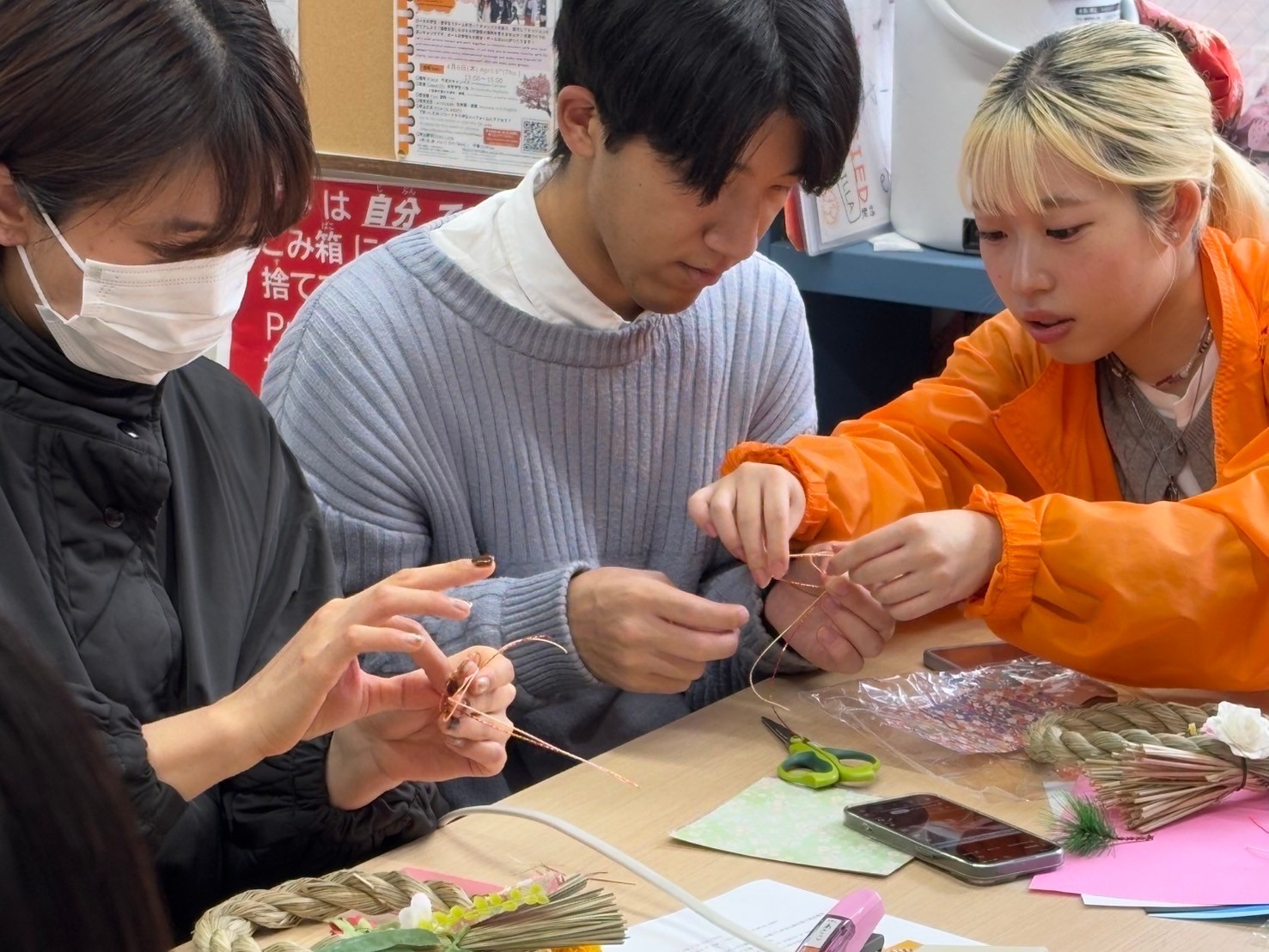
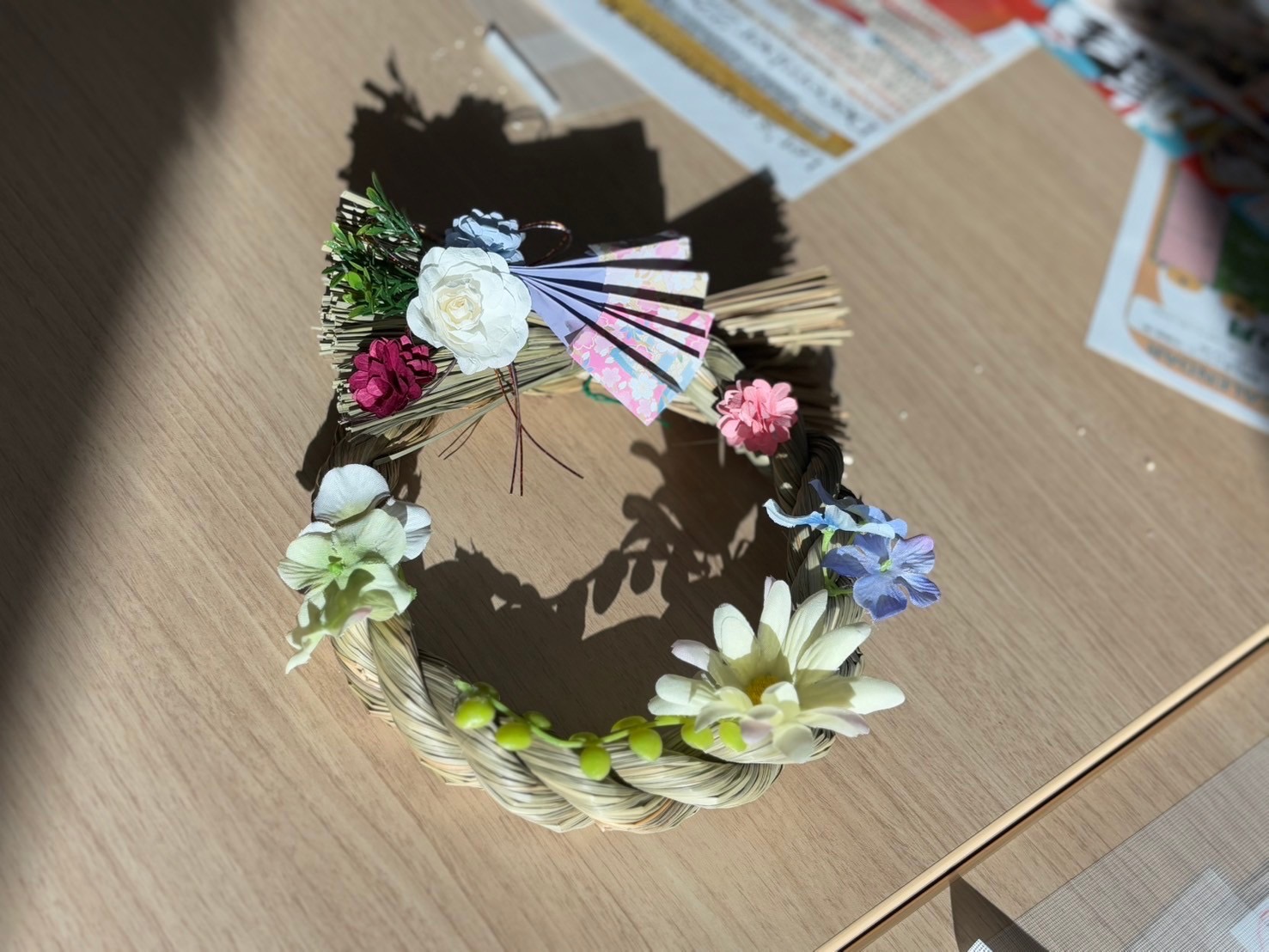
| Contact |
国際センター 留学生課 TEL:075-251-3257
|
|---|
From the very beginning, where they prepared the dough, to rolling it, cutting it, and filling it with paste, all tasks were done by the participants themselves.
Each person made their own unique yatsuhashi, and at the end, they enjoyed their handmade yatsuhashi with matcha tea.
They seemed to thoroughly enjoy the experience of creating their own personalized yatsuhashi. After the event, participants shared comments such as, "It was fun!" and "The yatsuhashi was delicious!"
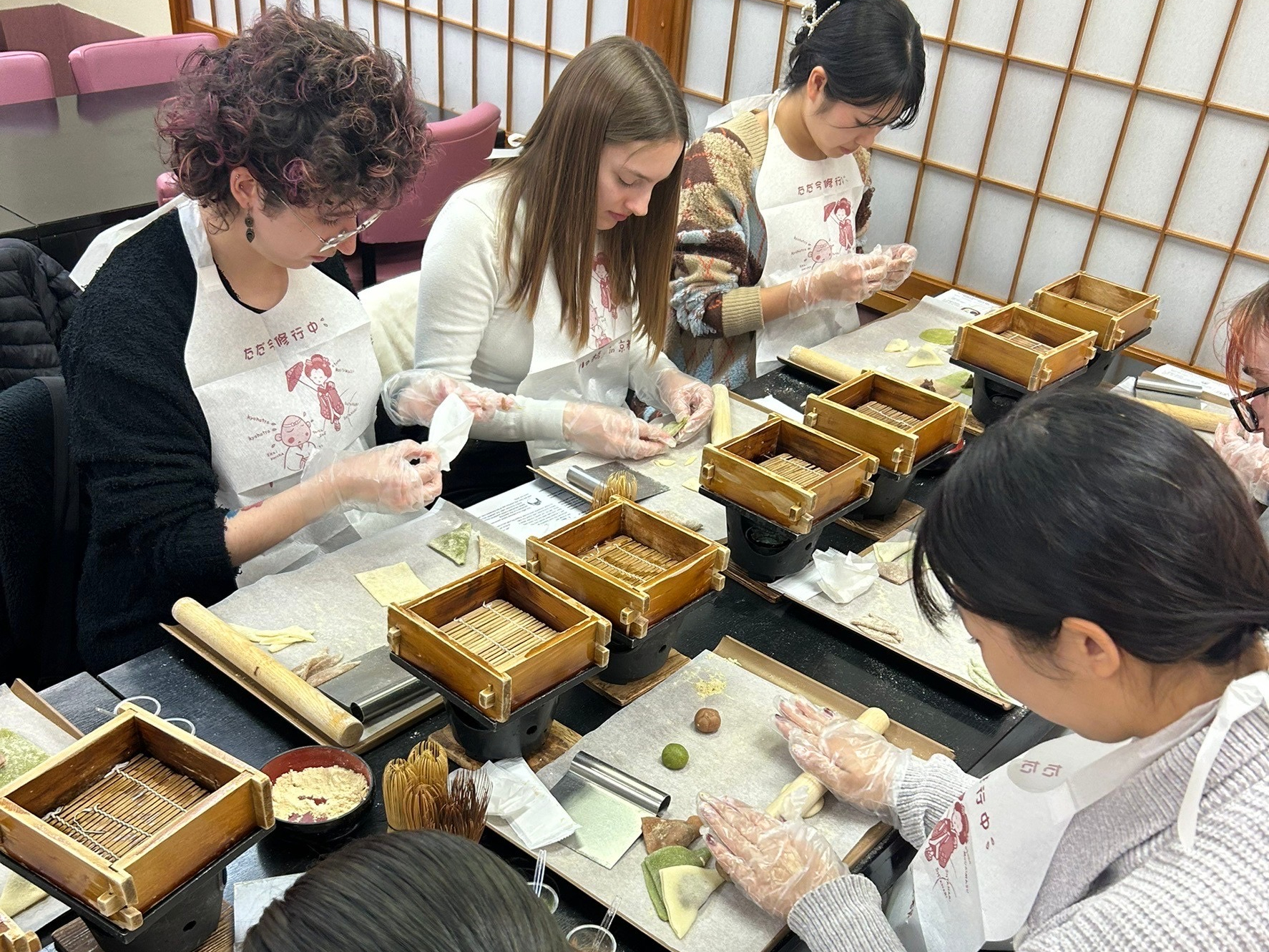
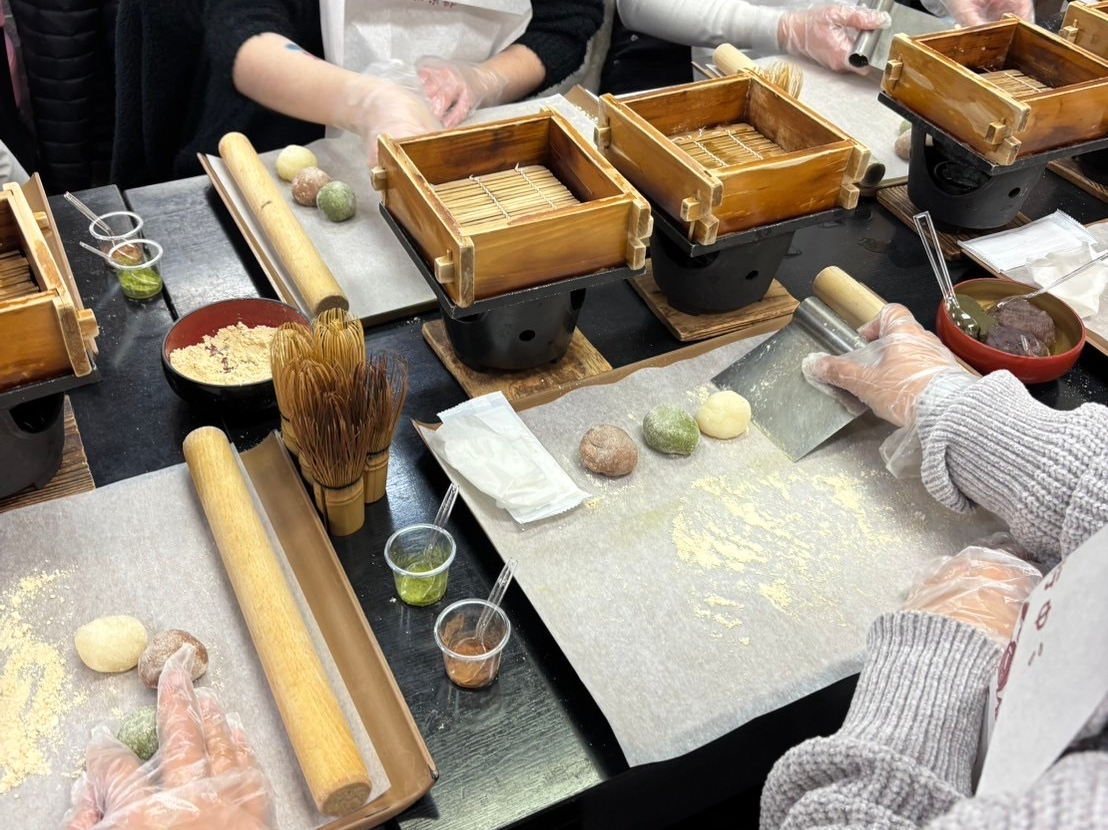
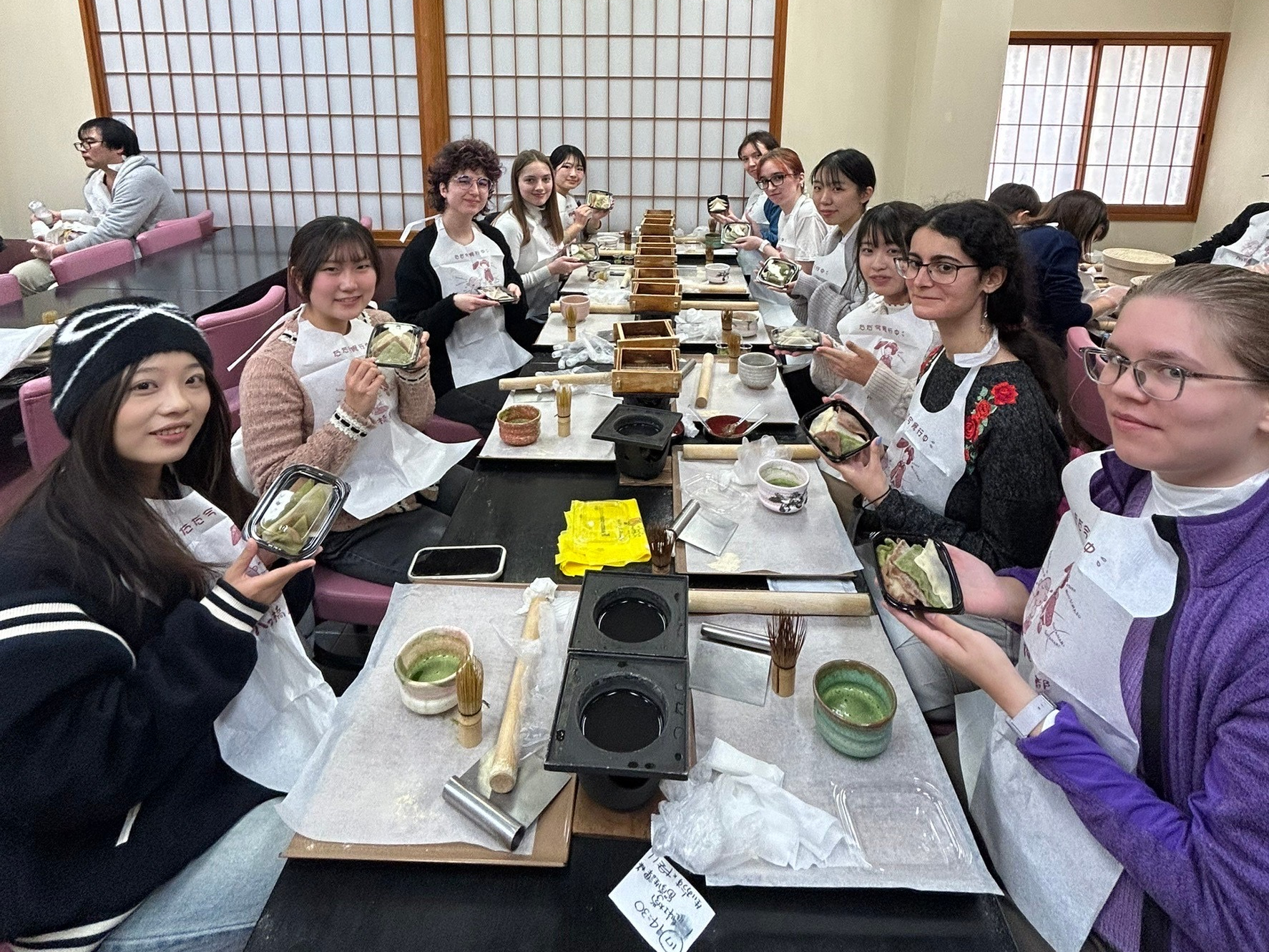
| Contact |
国際センター 留学生課 TEL:075-251-3257
|
|---|
For this event, we decided on a theme using a roulette wheel, and participants gave impromptu presentations based on 5 randomly displayed slides.
Both the presenters and the audience were highly engaged, and the atmosphere was filled with laughter and excitement throughout the event.
We are very happy with how it turned out.
SIED will continue to hold various international exchange events in the future, so please feel free to join us.
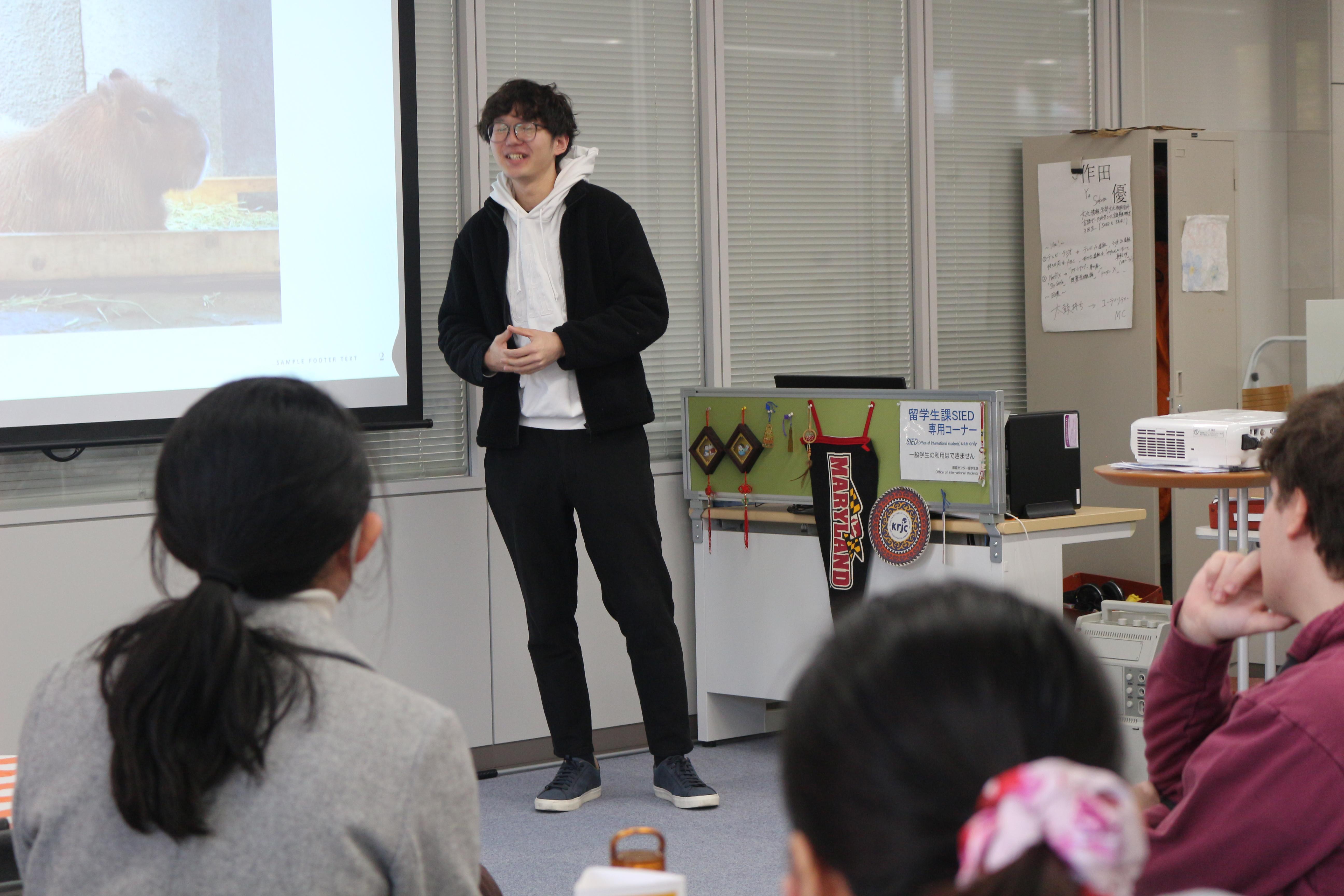
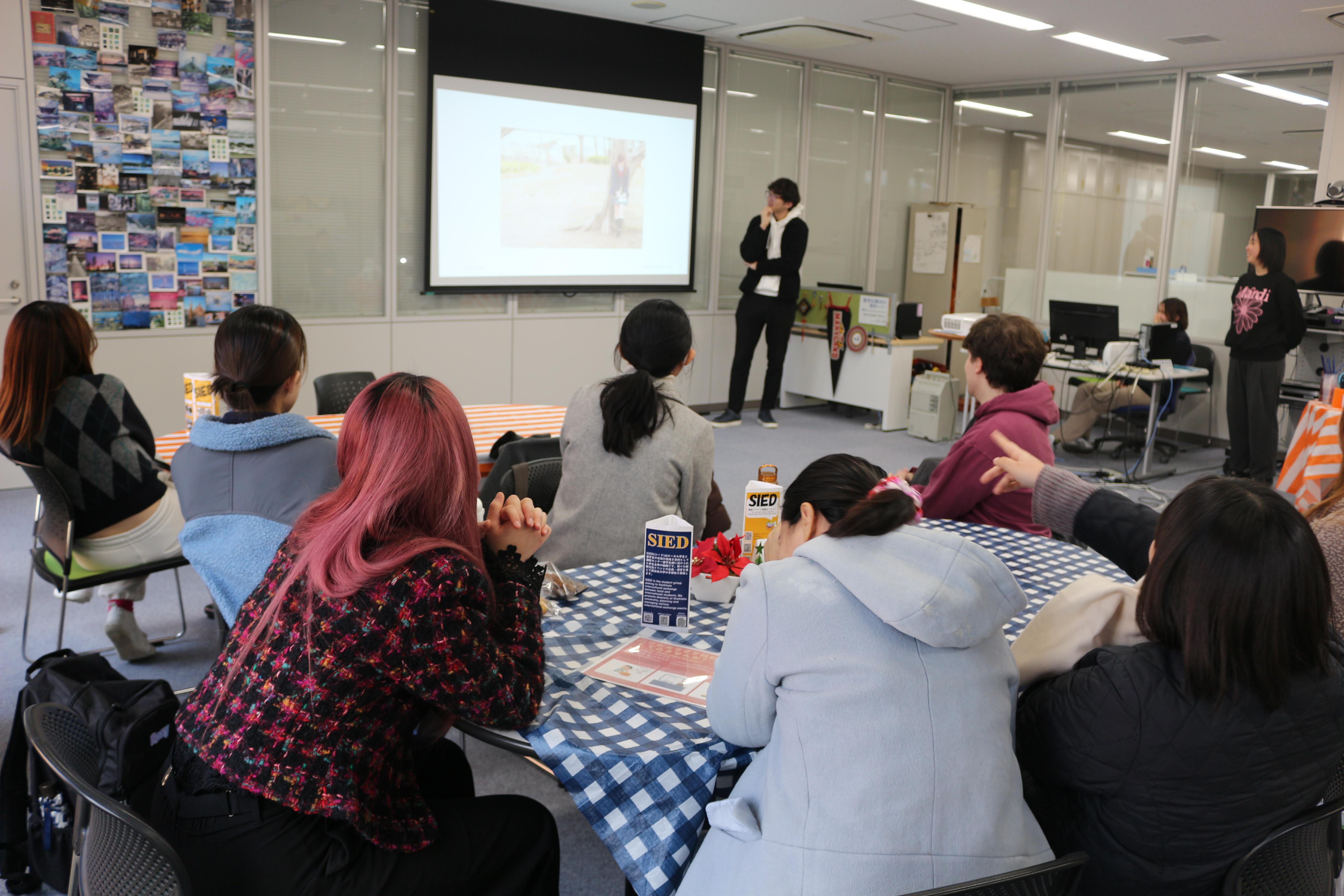
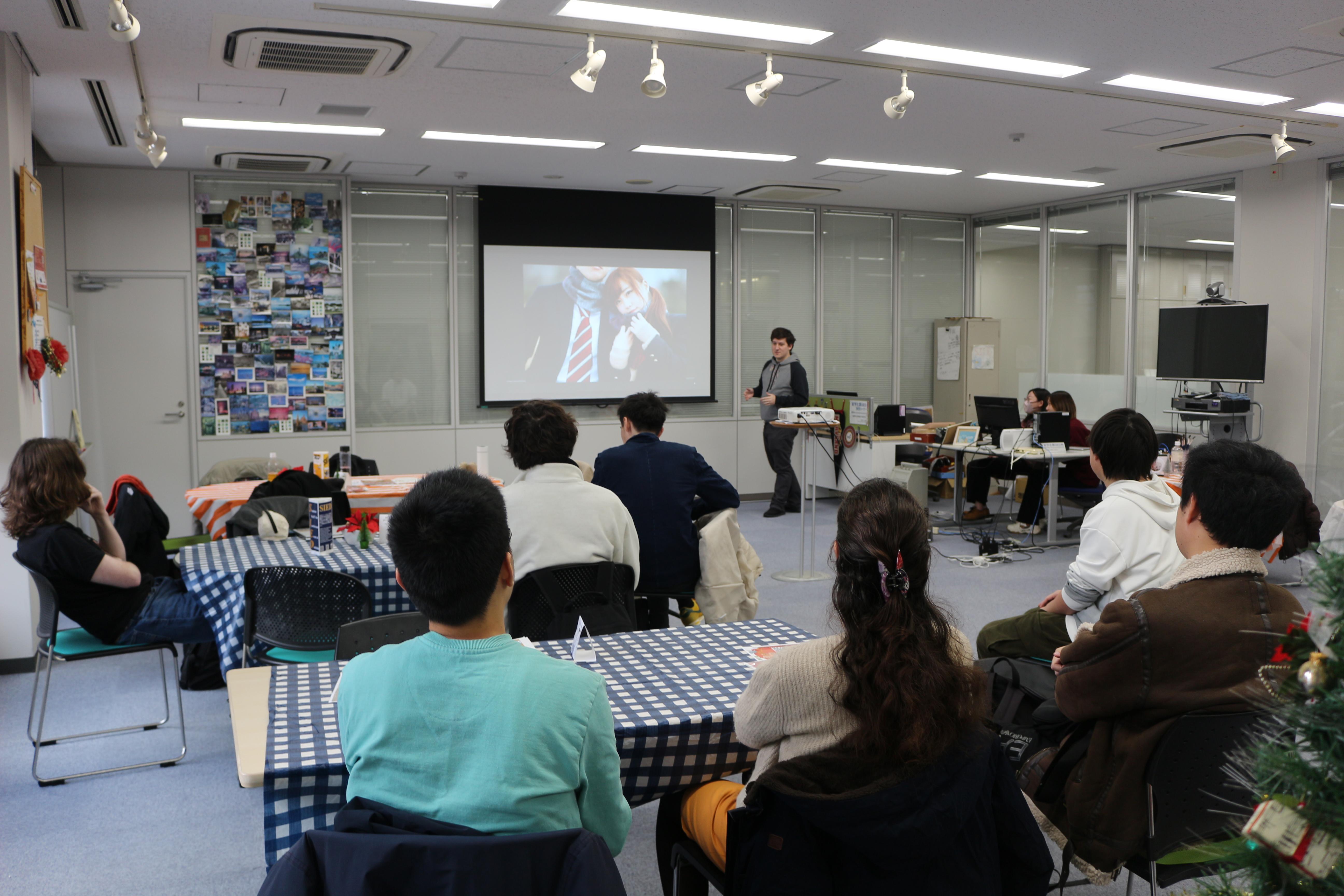
| Contact |
国際センター 留学生課(京田辺) TEL:0774-65-7453
|
|---|
Afterward, they dried their creations using an iron plate.
Throughout this process, everyone worked together in a friendly atmosphere, consulting each other when they were unsure about the steps or what to draw.
Each person completed their own unique piece of washi paper.
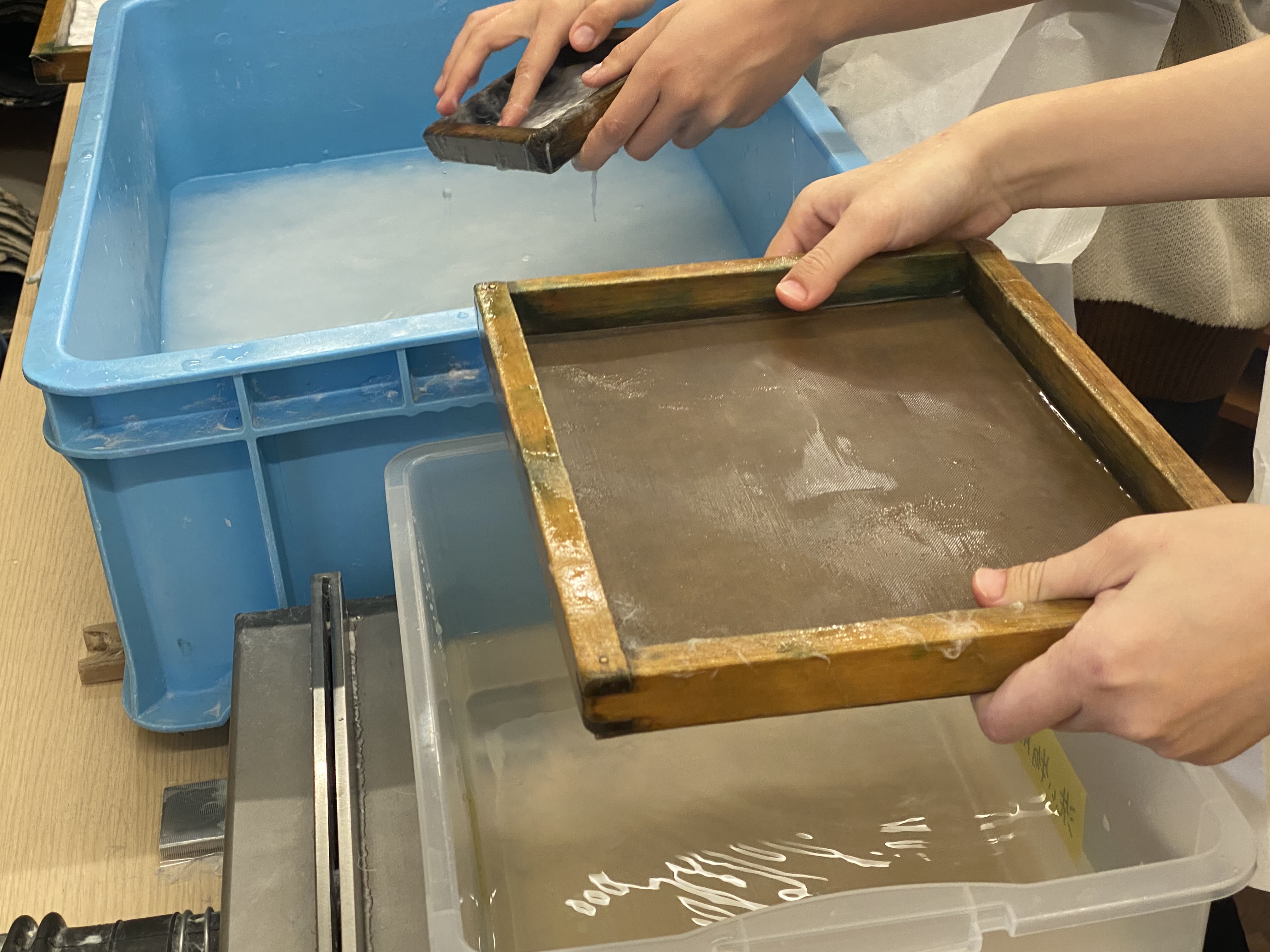
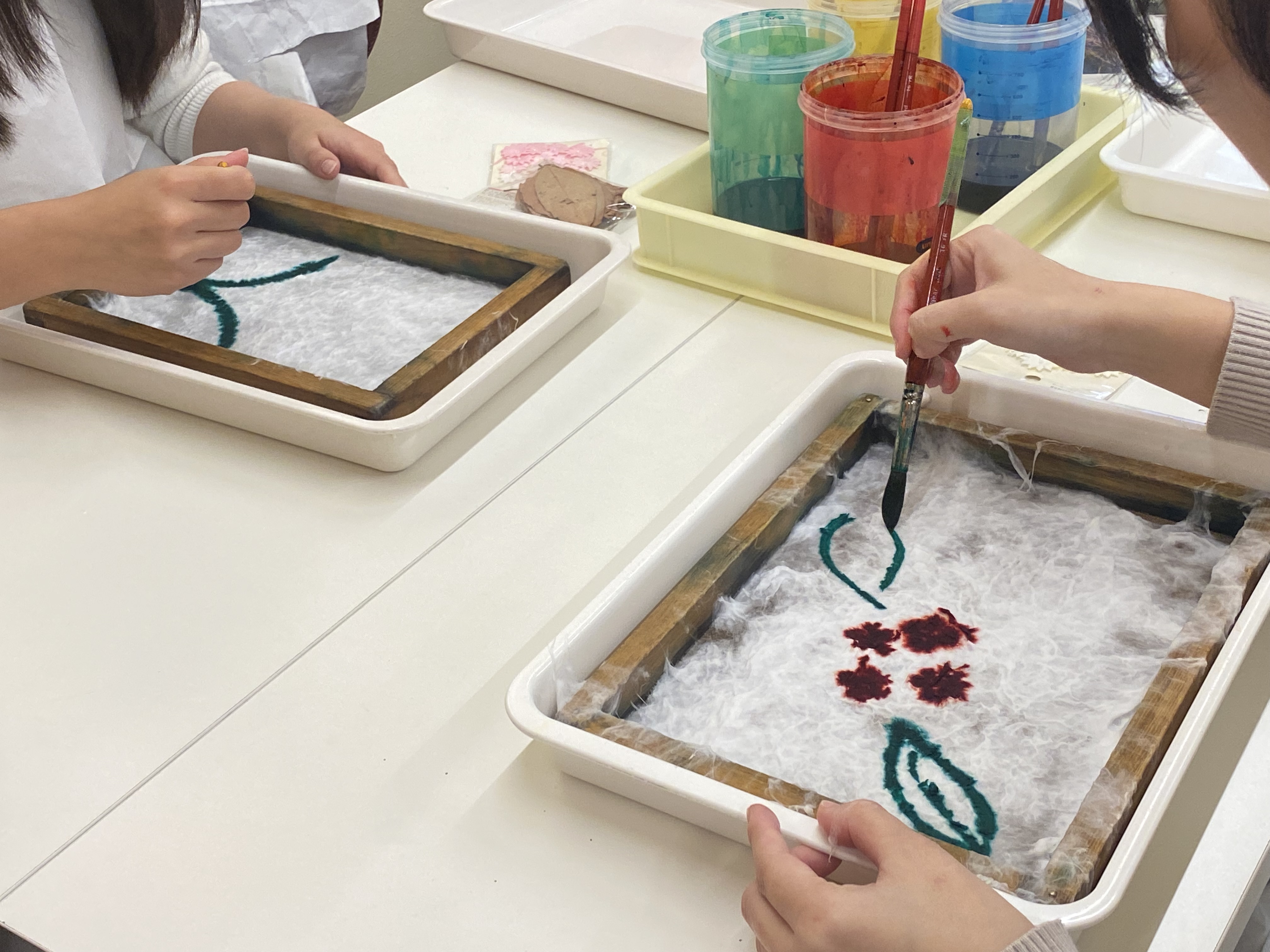
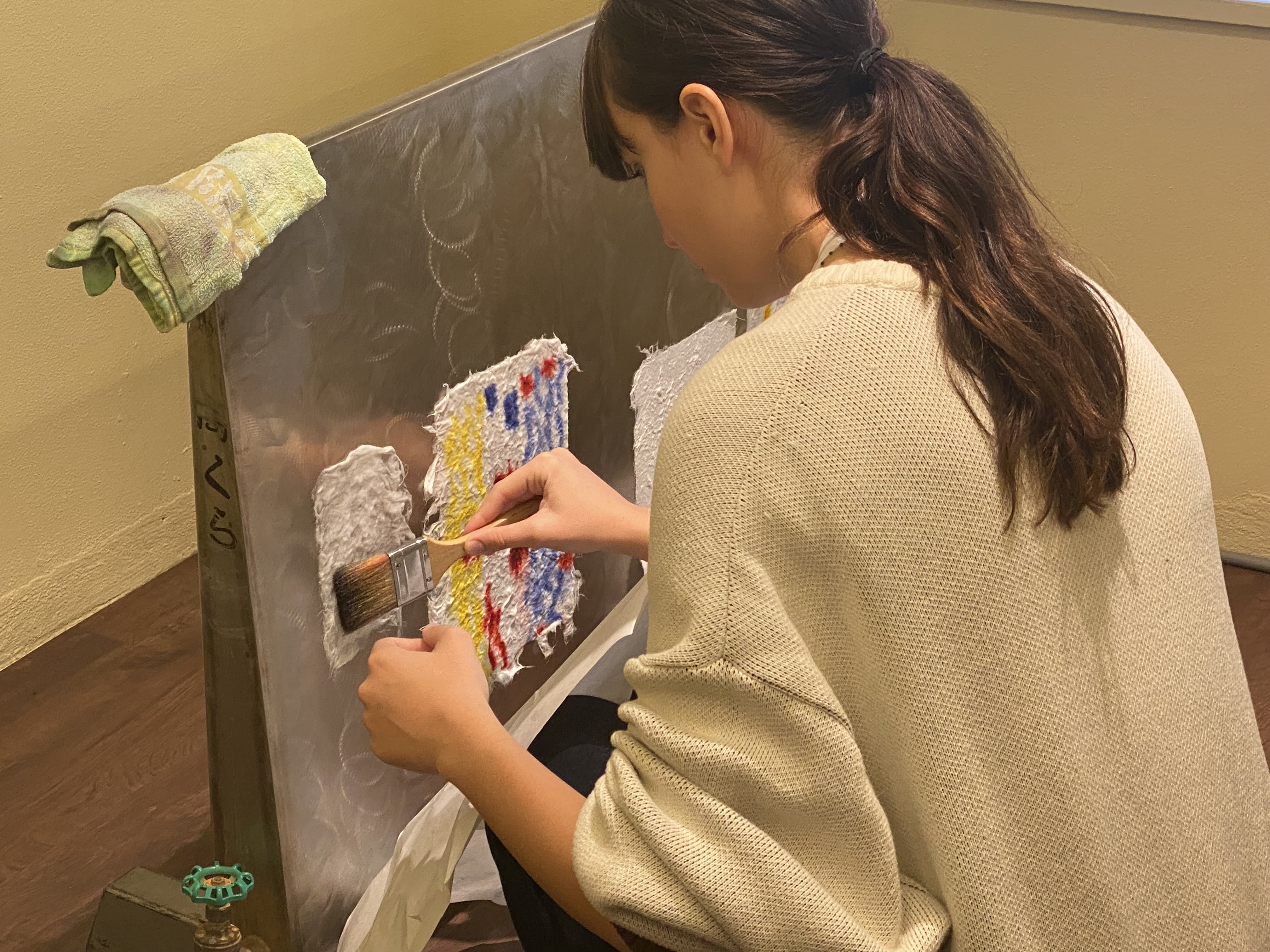
| Contact |
国際センター 留学生課 TEL:075-251-3257
|
|---|
In this event, Ms. MORITA Etsuko introduced Japan Overseas Cooperation Volunteers, and then, Ms. IETANI Noriko gave a presentation.
Ms. Ietani devoted herself to math and science education in Ghana, Samoa, and Indonesia.
She vigorously told us about math and science education in those countries and international cooperation, introducing daily life at assigned locations.
Lecturers answered these questions one by one, so this was a great opportunity to deepen thoughts on international cooperation!
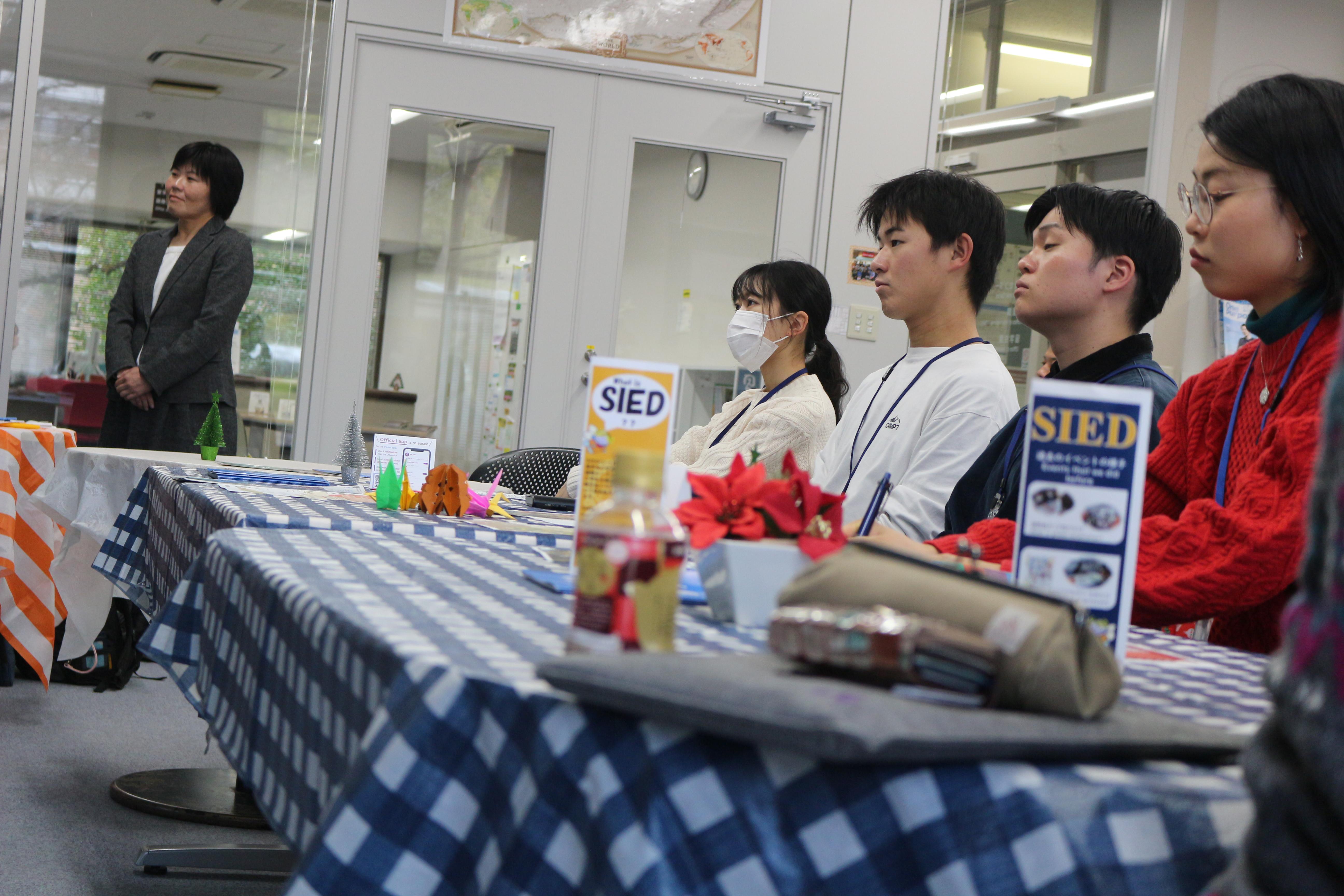
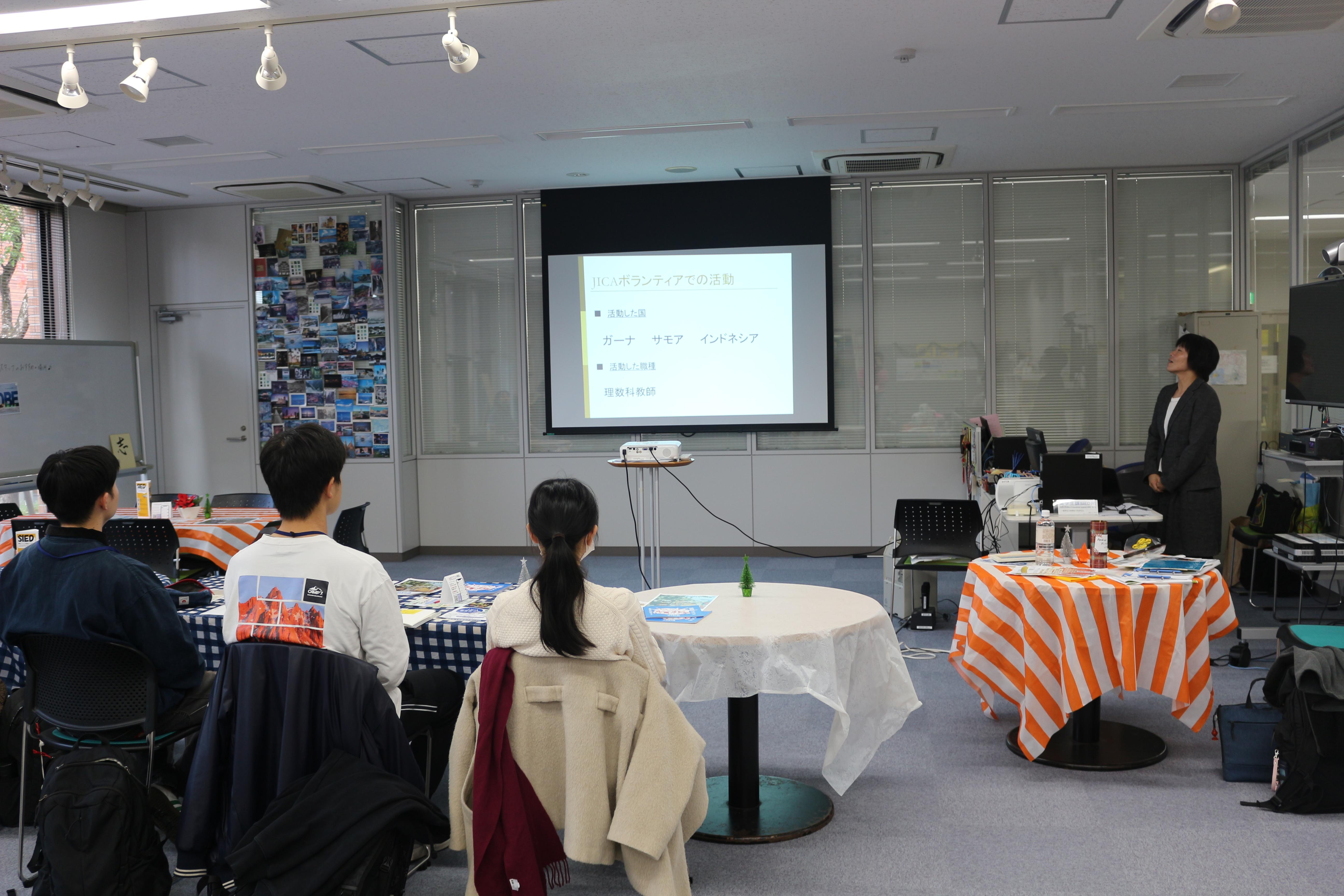
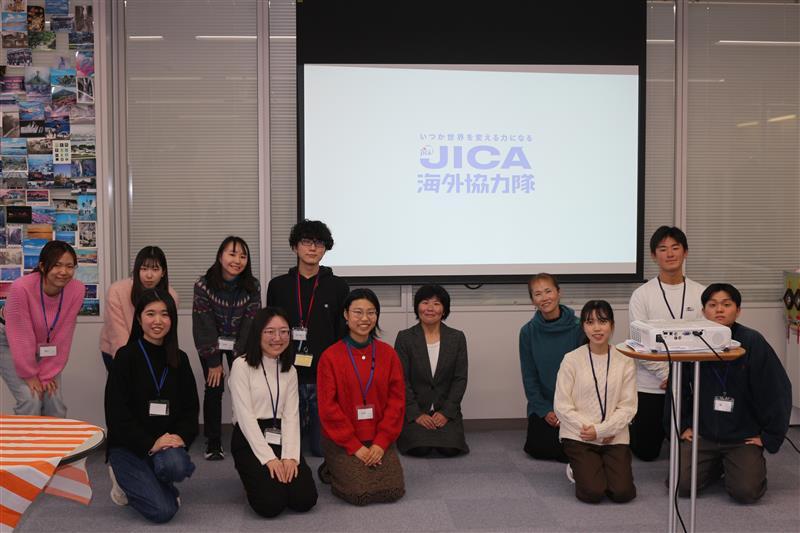
| Contact |
国際センター 留学生課(京田辺) TEL:0774-65-7453
|
|---|
The open lawn setting allowed many participants to enjoy interacting with each other.
During the lunch break, the international exchange while sharing a meal was lively, and most people communicated in English. Additionally, since the event was held outside the usual International Lounge where SIED typically organizes events, some participants showed interest in SIED itself and asked questions about our activities.
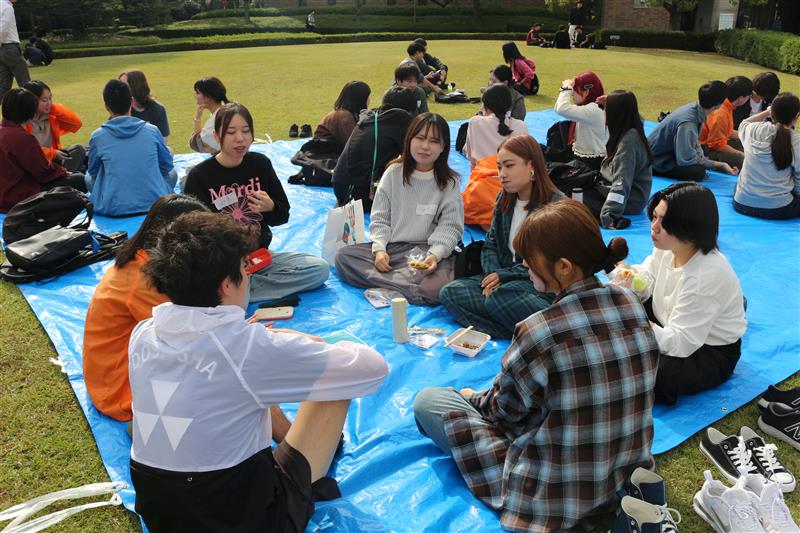
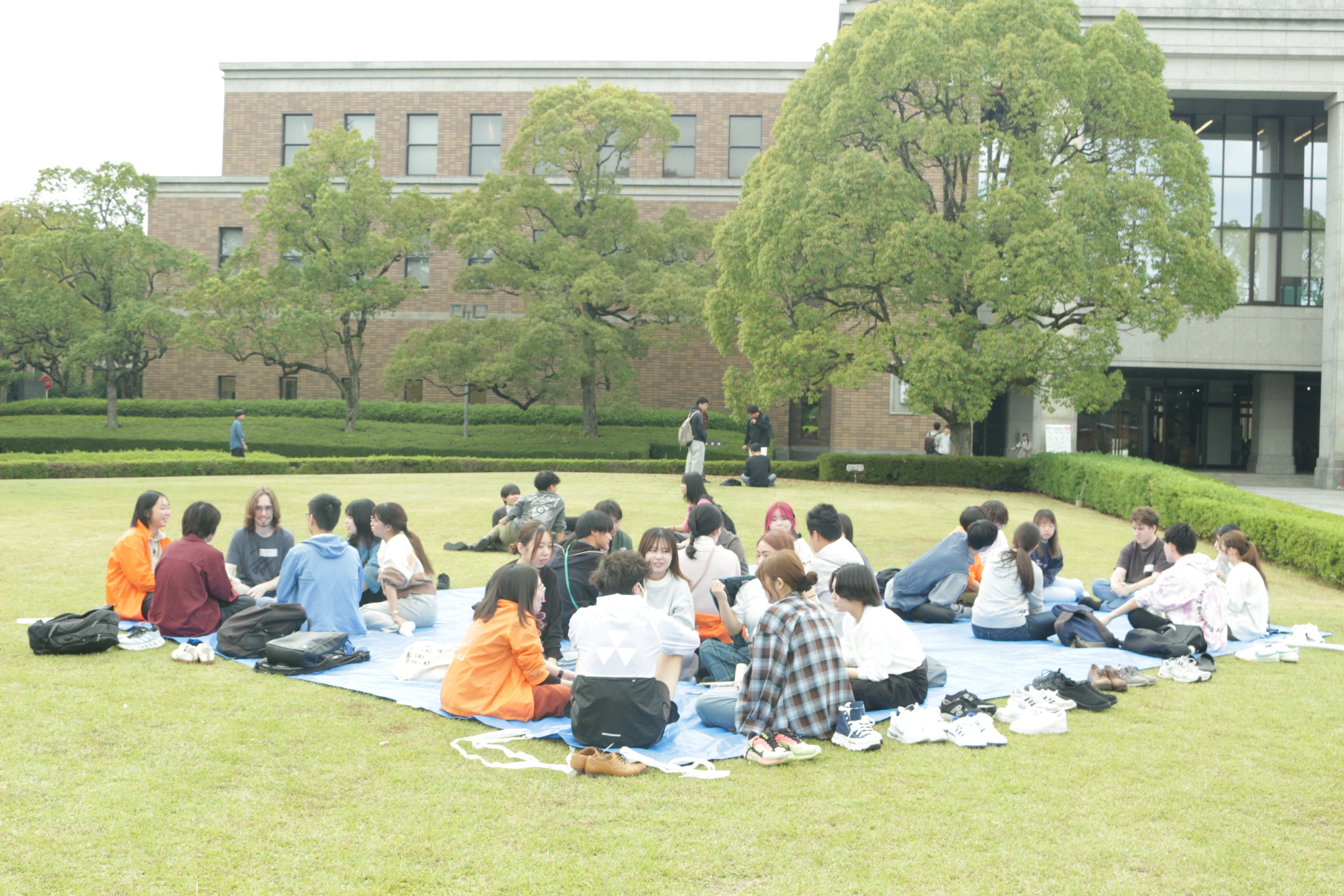
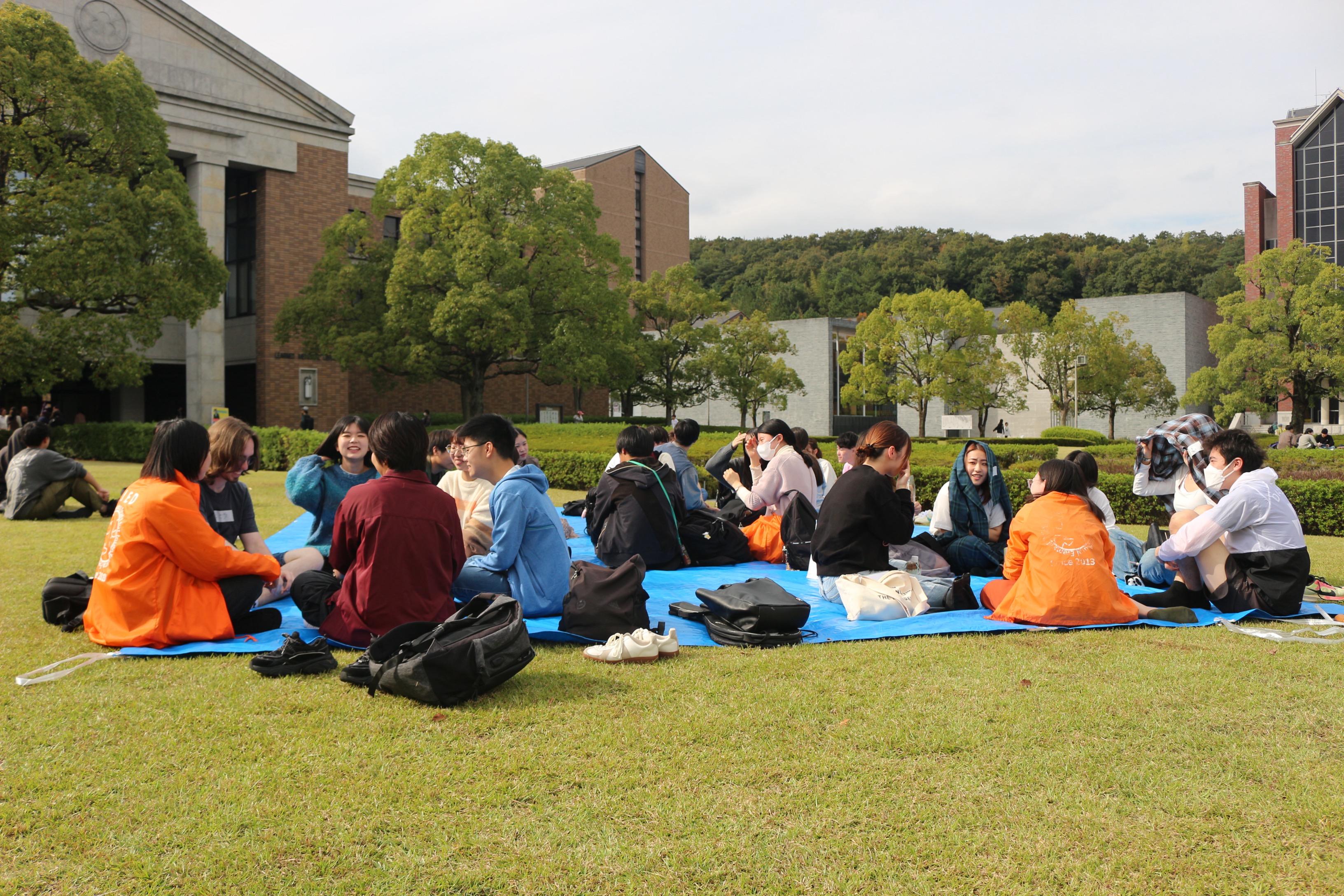
| Contact |
国際センター 留学生課(京田辺) TEL:0774-65-7453
|
|---|
A total of 7 participants joined us: 3 international students and 4 local students.
During the event, we had the participants experience the traditional Japanese art of calligraphy.
They first practiced on rice paper, and towards the end of the event, they wrote on colored paper for a final, one-shot calligraphy.
After finishing, they decorated their works with mizuhiki (decorative cords), creating many beautiful and vibrant pieces.
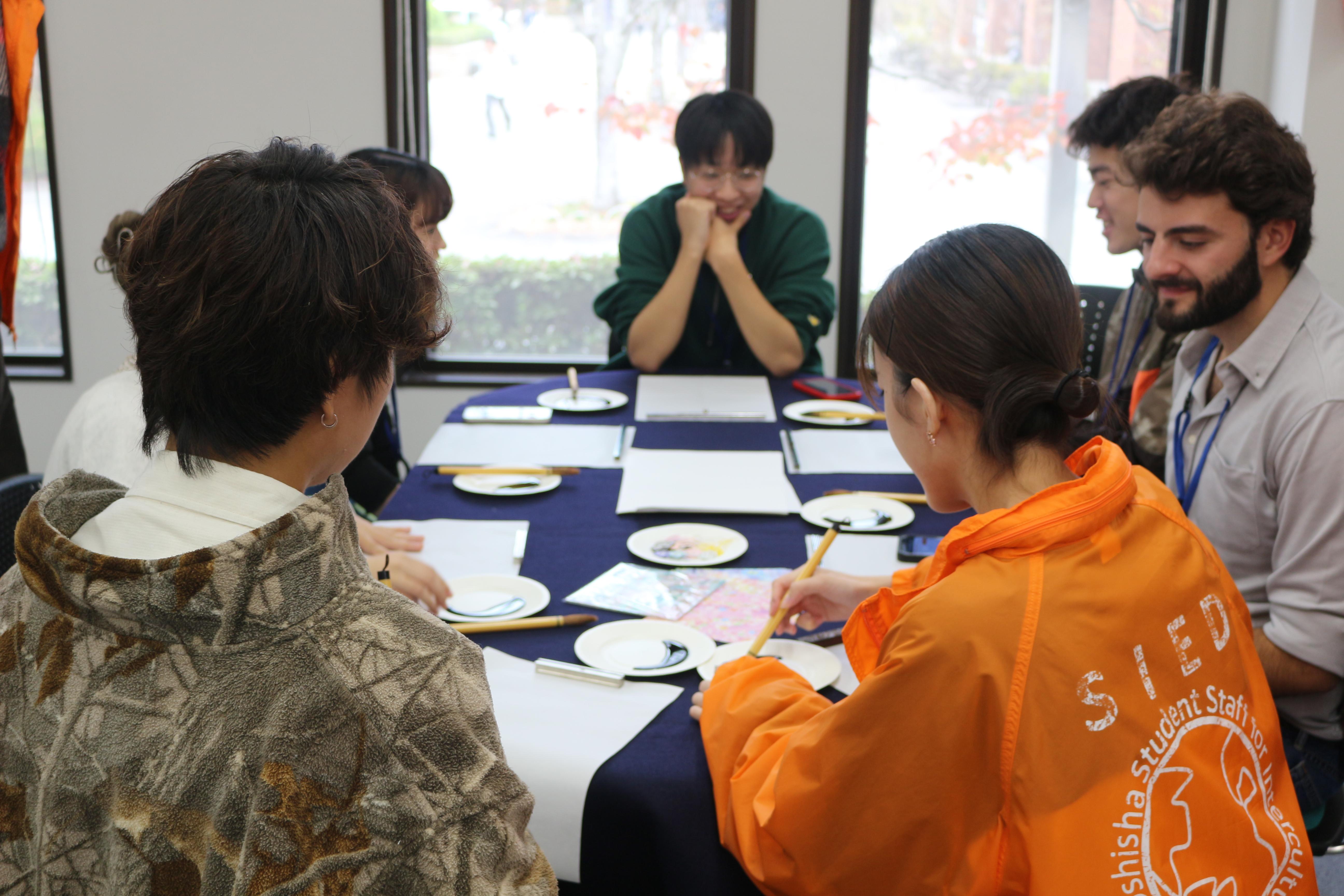
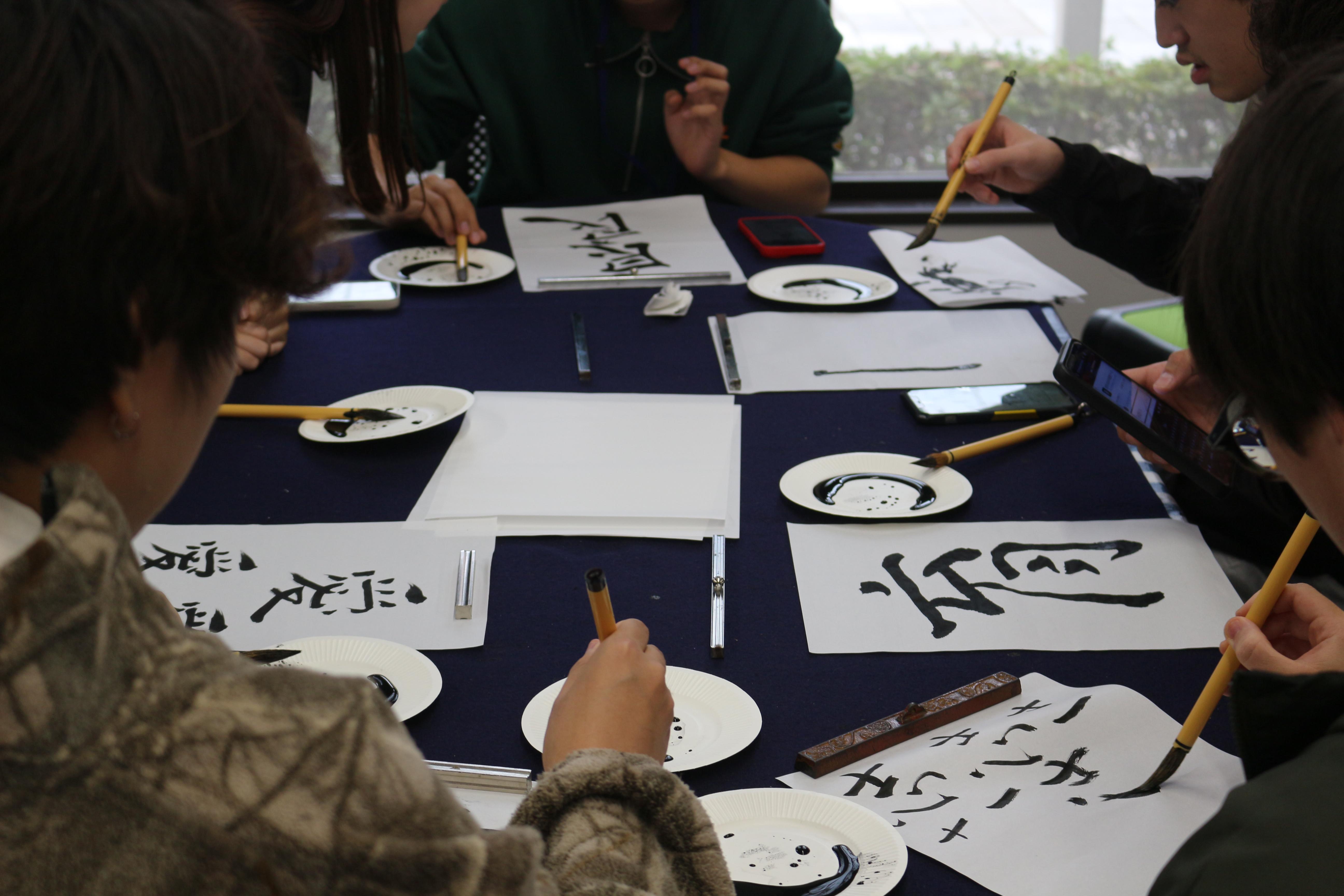
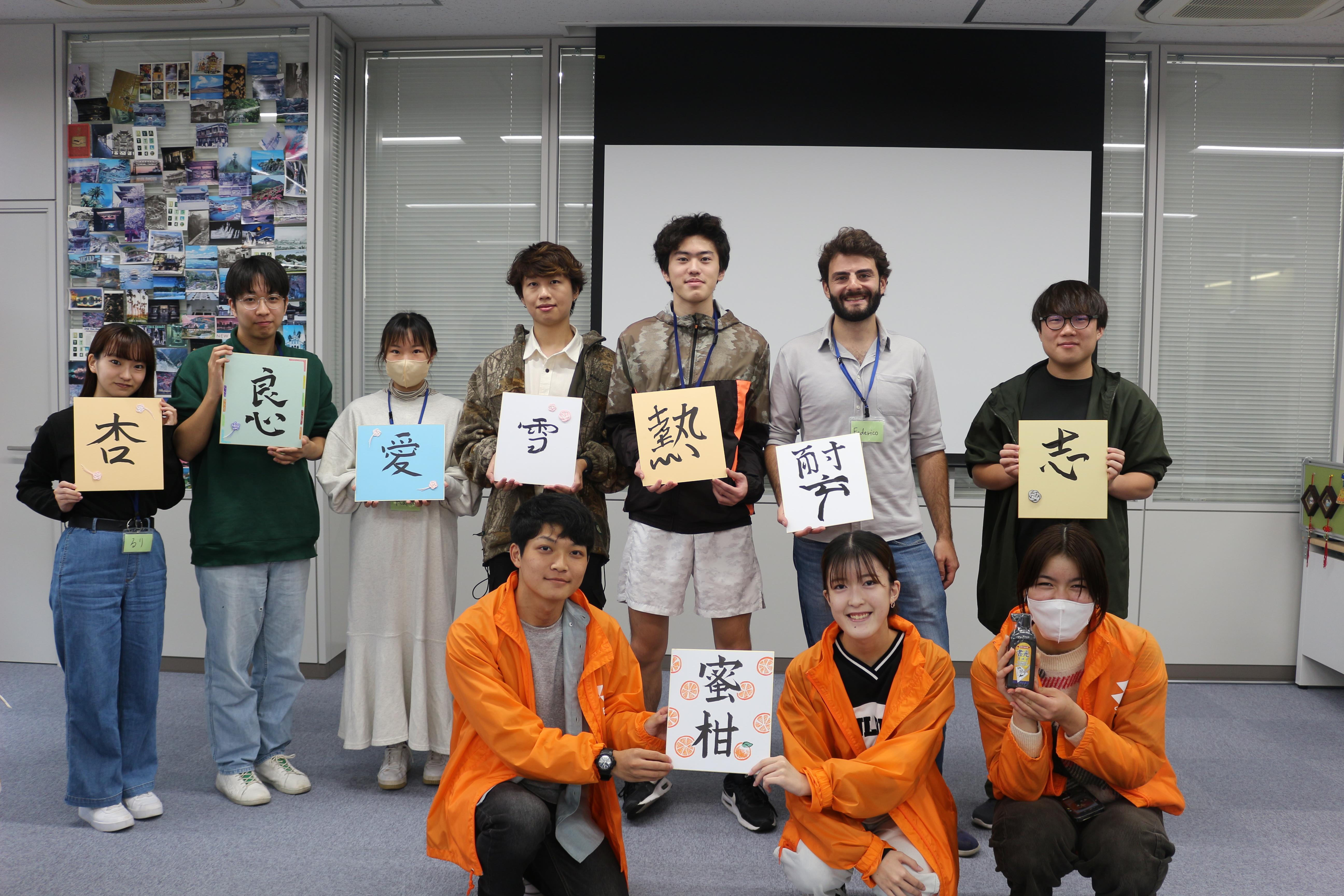
| Contact |
国際センター 留学生課(京田辺) TEL:0774-65-7453
|
|---|
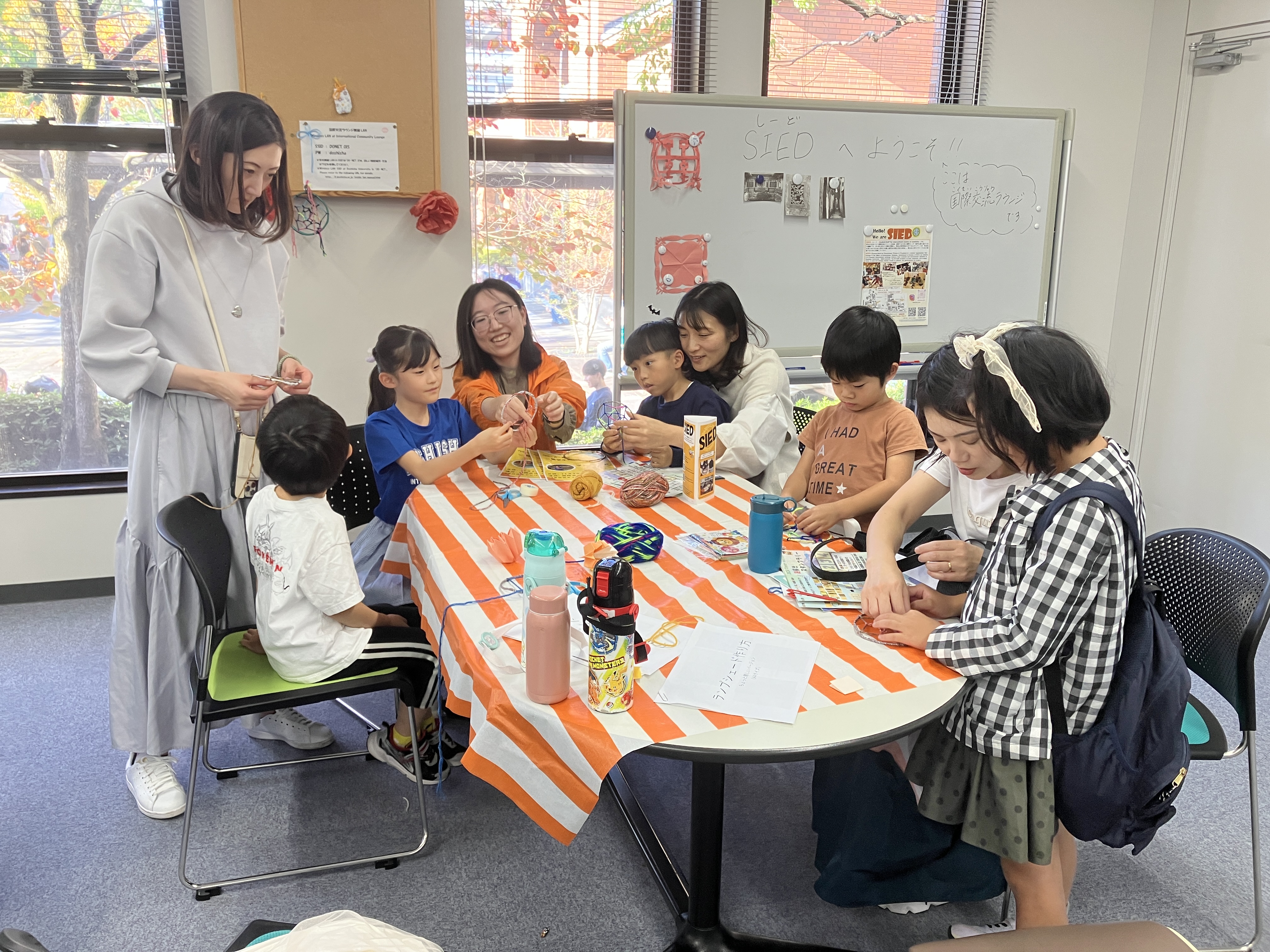
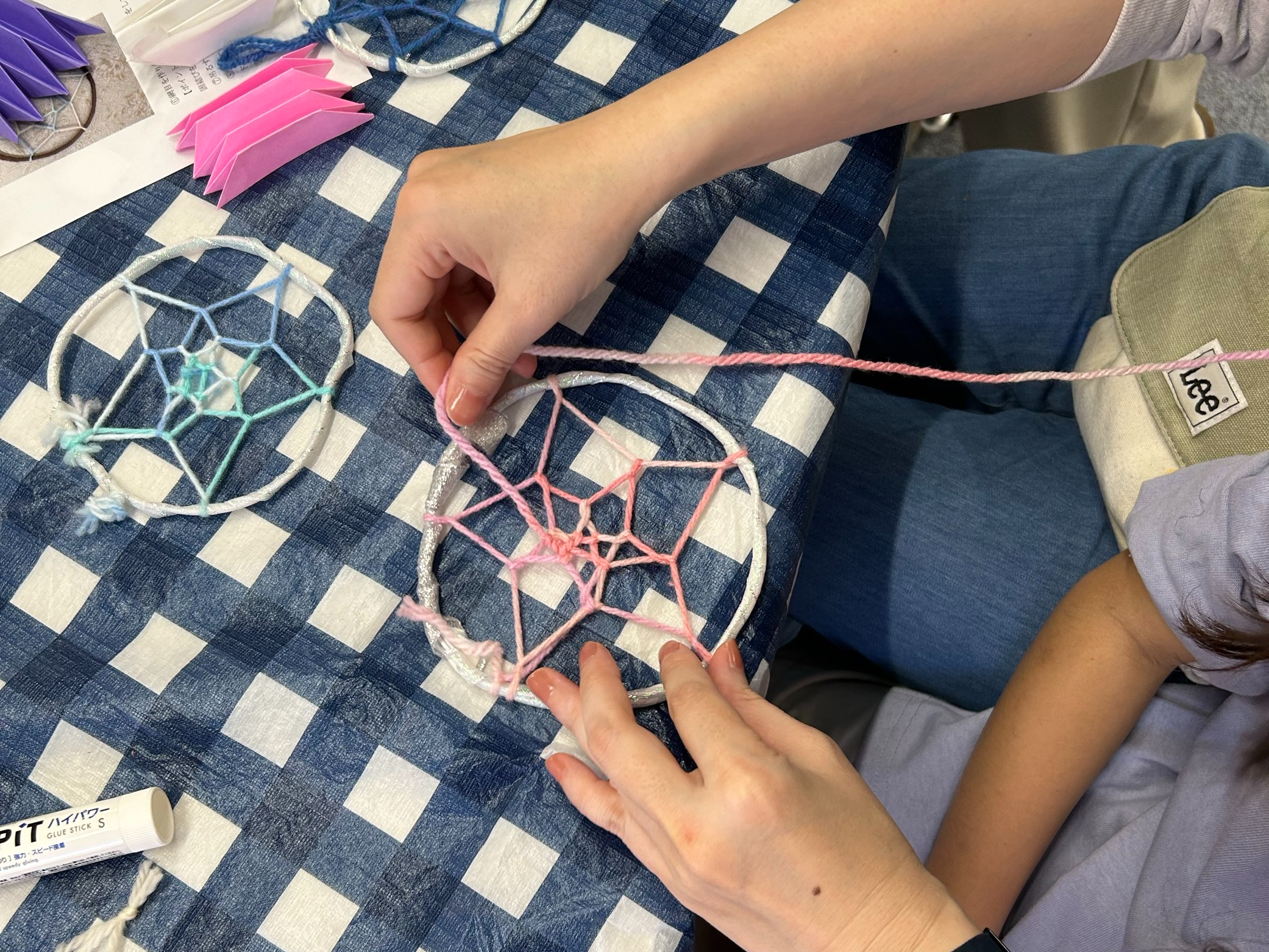
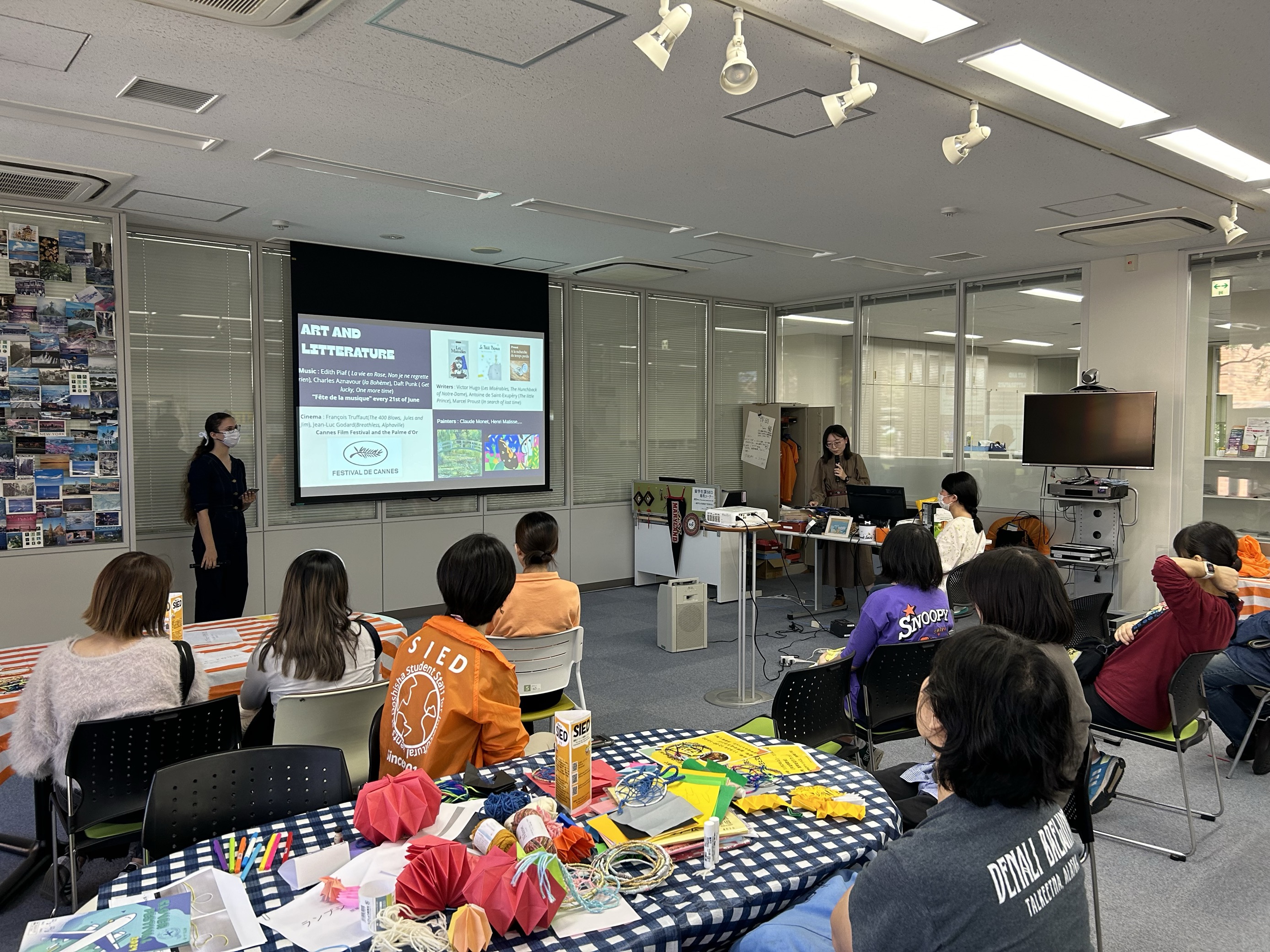
| Contact |
国際センター 留学生課(京田辺) TEL:0774-65-7453
|
|---|
